new posts in all blogs
Viewing: Blog Posts Tagged with: Saint Patricks Day, Most Recent at Top [Help]
Results 1 - 25 of 36
How to use this Page
You are viewing the most recent posts tagged with the words: Saint Patricks Day in the JacketFlap blog reader. What is a tag? Think of a tag as a keyword or category label. Tags can both help you find posts on JacketFlap.com as well as provide an easy way for you to "remember" and classify posts for later recall. Try adding a tag yourself by clicking "Add a tag" below a post's header. Scroll down through the list of Recent Posts in the left column and click on a post title that sounds interesting. You can view all posts from a specific blog by clicking the Blog name in the right column, or you can click a 'More Posts from this Blog' link in any individual post.
Actually, I’m one-quarter Irish thanks to my maternal grandmother, but that never stopped me from celebrating St. Patrick’s Day! FYI - in Book #6 of The Last Timekeepers series, I'm planning on setting my time travel sites on this beautiful country. So, sit down, take a load off, and pour yourself a pint of green ale. Aye, here’s to Saint Paddy, banisher of snakes, and founder of monasteries and churches. Now, while you’re waiting for your corn beef and cabbage dinner to boil, have a gander at these six amazing places to visit if you ever get a chance to venture over to the Emerald Isle, suggested to me by my author bud and paranormal romance queen, Dominique Eastwick.
Giants Causeway in Northern Ireland Renowned for its polygonal columns of layered basalt, is the only World Heritage site in Northern Ireland. Resulting from a volcanic eruption 60 million years ago, this is the focal point of a designated Area of Outstanding Natural Beauty and has attracted visitors for centuries.
NewgrangeConstructed over 5,000 years ago (about 3,200 B.C.), making it older than Stonehenge in England and the Great Pyramid of Giza in Egypt. Newgrange was built during the Neolithic or New Stone Age by a farming community that prospered on the rich lands of the Boyne Valley. Archaeologists classified Newgrange as a passage tomb, however Newgrange is now recognized to be much more than a passage tomb. Ancient Temple is a more fitting classification, a place of astrological, spiritual, religious and ceremonial importance, much as present day cathedrals are places of prestige and worship where dignitaries my be laid to rest.
Kilmainham Gaol Prison in DublinBuilt in 1792, it is Ireland's most famous disused prison. It held throughout the years many famous Nationalists and Republicans in members of the Society of United Irishmen (1798), Young Irelanders (c1840s), Fenians and Land agitators, Parnell, Davitt. The leaders of the 1916 Easter Rising were executed here. The prison was closed in 1924. This building gives a good insight into the history of Irish Republicanism.
Dublin Castle (doing Kilmainhaim Gaol first helps with the history) Originally built in the 13th century on a site previously settled by the Vikings it functioned as a military fortress, a prison, treasury, courts of law and the seat of English Administration in Ireland for 700 years. Rebuilt in the 17th, 18th, 19th and 20th centuries, Dublin Castle is now used for important State receptions and Presidential Inaugurations.
Cliffs of MoherThe Cliffs of Moher are one of Ireland's top Visitor attractions and are a designated UNESCO Geo Park. The Cliffs are 214m high at the highest point and range for 8 kilometres over the Atlantic Ocean on the western seaboard of County Clare. O'Brien's Tower stands proudly on a headland of the majestic Cliffs. From the Cliffs one can see the Aran Islands, Galway Bay, as well as The Twelve Pins, the Maum Turk Mountains in Connemara and Loop Head to the South. The Cliffs of Moher take their name from a ruined promontory fort “Mothar” which was demolished during the Napoleonic wars to make room for a signal tower. And I saved the best for last…
Guinness StorehouseThe best view of the city and Ireland’s number one visitor attraction. Go figure! The home of the world famous GUINNESS® brand, this historical building is central to Dublin’s and Ireland’s heritage, and has been continually updated to create a blend of fascinating industrial tradition with a contemporary edge. Oh yeah, and you’re also invited to pour your own perfect pint. Cheers!
Now, before you go check on your corn beef and cabbage, please raise your frosty glass high to toast Saint Patrick and Ireland with me: May your pockets be heavy and your heart be light, may good luck pursue you each morning and night.
Slainte!
.png.jpg?picon=3640)
By:
Sara Burrier,
on 2/25/2015
Blog:
warrior princess dream
(
Login to Add to MyJacketFlap)
JacketFlap tags:
illustration,
drawing,
lucky,
watercolor,
green,
shamrock,
saint patrick's day,
redhead,
licensing art,
Add a tag
New Art!
Created for Creative Design Outlet and Crafts and Me digital stamps. Coming soon!
• • • • • • • • • • • • • • • • • • • • • • • • • • • • • • • • • • • • • • • • • • • • • • • • • • • • • • • • • • • • • • • • • • • • • • • • • • • • • • • • • • • • • • • • • • • • • • • • • • • • • • • • • • •
In true Irish fashion my Dad passed away Sunday morning. The prior Sunday he suffered a massive heart attack. As a result his brain was damaged and, reluctantly, we had no choice but to let him go. After a very long night he finally passed on. It turns out that the last story he needed to tell was that he passed away on Saint Patrick's Day.
My Dad taught me many, many valuable things. Among them his great sense of humor, gift of story telling and love of the outdoors.
He never missed an opportunity to tell someone that I was a "cartoonist"- something he was very proud of and, admittedly, could never quite understand. I can remember many times, at his request, drawing eagles on cocktail napkins for all of his friends- my first art commissions as I was often given quarters or dollars for the drawings. As I was growing up he would take me on fishing trips from the far north of Quebec, New Brunswick and Ontario, to northern Maine, as close as our own Pennsylvania and, of course, his beloved Delaware River. Those are some of the most cherished memories I have to this day.
Anyone who knew him will miss him dearly. Thank you so very much for all of the prayers and notes of kindness. With Daisy away in Switzerland last week I have no doubt that it was God's answer to your prayers that held me together.
I know I'm probably behind the times with this, but I just recently watched the movie "
The Secret of Kells" and wanted to give it a shout out on St. Patrick's Day. If you haven't seen this movie, rent it, or better yet, buy it! The story is good, but the visuals are so over-the-top awesome.
It's based on the story (folklore?) of how
The Book of Kells was created. The beautiful graphic nature of the images just blows me away - as I'm both a children's illustrator and graphic artist, they just give me goosebumps! I don't know much about The Book of Kells, but I've seen glimpes of the art, and it looks gorgeous!
Here are some images from the movie – aren't they awesome?
By: 1questionaday,
on 3/17/2011
Blog:
One Question A Day
(
Login to Add to MyJacketFlap)
JacketFlap tags:
Food,
Friends,
writing,
Fashion,
Luck,
Spring,
holiday,
St. Patrick's Day,
Funny,
Parties,
questions,
Saint Patrick's Day,
Add a tag
I grew up on an island in the Mediterranean where there were very few Irish people, or people of Irish decent for that matter, so (alas and alack) I did not really get to enjoy a St. Patrick's Day while I was growing up. After I left university I spent a summer in Dublin and grew very fond of the Irish people, their beautiful country, and their interesting history. I did not grow to love the damp Irish weather however. Then, when I moved to the U.S. I finally got to celebrate Saint Patrick's Day, getting into the swing of things by donning green clothes, drinking green beer, and even baking Irish soda bread.
Since I started reviewing books I have come across a wonderful variety of children's books about Ireland and about St. Patrick's Day. You can look at the books I have reviewed in the Through the Looking Glass
Saint Patrick's Day feature. There are a variety of books in the collection for readers of all kinds. One in particular that I enjoyed was
S is for Shamrock: An Ireland Alphabet. This is one of several alphabet books published by Sleeping Bear Press. It is the kind of book readers of almost any age - except the very young perhaps - can enjoy. Children (and adults) who read this book will find out many things about Ireland and about the Irish people.
This is a repost of a quicky sketch I did for our blog at Illustration For Kids for last week’s topic, “Green”. Today’s the day to put this little leprechaun guy up again. Happy Saint Patrick’s Day to you all.
Happy St Pat's Day. Pemberthy has written some words in honour of the day.
Happy Happy Saint Patrick’s Day to you – or should that be Top of the Mornin’? Primula and I have decorated the toy room in green in honour of the special day. It looks like a troupe of leprechauns have paid us a call.
You might have guessed by my name that I am NOT really Irish, but my friend (and biographer)
Sally does have an Irish surname and some Irish ancestry, so I guess that makes me Irish by association. Sally says that anyone who has ever had even a tiny connection to Ireland claims to be Irish on Saint Pat’s day. So, just for today, I’m celebrating.
Actually, if the truth be known, I like to celebrate every day – celebrate Saint Pat’s day, celebrate Friendship Day, celebrate Easter (nearly here) or just celebrate being alive.
So, for today, Happy Saint Patrick’s Day. And for tomorrow – Happy Day!
Happy happy happy.
Blake Nelson is an established young adult author with the following titles under his belt: The New Rules of High School, Rock Star Superstar, Gender Blender, Paranoid Park, Prom Anonymous, and They Came From Below. His titles have been featured on several of YALSA’s booklists including Teens Top Ten (Prom Anonymous), and nominated for Best Books for Young Adults 2008 (They Came From Below) and 2005 (Rock Star, Superstar). If you’re a young adult/teen librarian like me trying to find realistic fiction to recommend to a teenage male that’s a fun read, recommend one of Blake Nelson’s books. He’s also written a couple of adult novels: Exile and User. His first novel Girl is being republished with a great new cover. We’re looking forward to the reissue.
Some of you may be familiar with Blake’s blog, if you’re not you should definitely check it out. This interview probably doesn’t do him justice, but you can glean more of what he’s like by reading his blog entries. I first came across his blog when he was blogging about his experience at the Cannes Film Festival. His book Paranoid Park was picked up and adapted into a screenplay by Gus Van Sant and turned into a movie. It had a warm reception at Cannes and has been featured at several film festivals since.
Paranoid Park the movie, what was the process of adapting the novel to a screenplay?
There wasn’t much adapting on my end. I sent the book to Gus because he had almost optioned my book ROCK STAR SUPERSTAR, and I thought he would like it. He did and I think he started working on the screenplay right then, because by the time all he paperwork was done, he pretty much had it.
I saw an early draft and it stuck pretty much exactly to the book so I was pleased, though I am all for Directors doing their own thing. If that’s what they want to do.
Who would you chose to play yourself in the Blake Nelson movie?
Billy Crudup. I feel kind of lost a lot of the time. He looks kind of lost.
What’s the biggest secret that you remember from high school?
That I was a big reader and was into cultural stuff beside music. I was on the football team and played in bands, so I probably appeared not too bookish.
Do you research your characters before you create them? Are you a skater?
I did some research about skating, which is unusual. Usually I just go for it and if good characters appear I keep going. If the characters don’t work, or the story isn’t right, I stop and start over.
Rock Star, Superstar is about a serious musician who suddenly finds himself in an up-and-coming rock band. Were you ever in a band? Who is in heavy rotation on your stereo (or iPod) now?
Yes I was in a band, and it has served me well as a writer. I have written a lot about it. My favorite group of the new bands around now (3 CDs or under, is INTERPOL.)
Did David Lee Roth really drink iced tea from a whiskey bottle?
That’s what I heard, though you hear a lot of things in dressing rooms.
Your male protagonists seem to get the girls relatively easily, any dating advice for high school guys?
My characters are sort of clueless or obsessed in some way about something. So I guess my advice is don’t think about girls that much. Do what you love and the girls will find you.
They Came from Below is your first foray into a science fiction/fantasy book, was writing in a different genre difficult or a nice change of pace?
It was a blast. Really enjoyed getting into some heavy ideas and some “BIG ISSUES.” I loved that feeling of following an interesting idea out as far as it would go.
What inspired you to write They Came from Below? Do you consider yourself an environmentalist? Impressions of Al Gore’s documentary An Inconvenient Truth?
No, I am from Oregon and we think about that stuff more than other people. Also, I think generally, people are flawed and they make mistakes, and do stupid things. But messing up the planet is not the same. We can’t really afford to do that.
As a young adult librarian I go to schools and talk about books to middle and high school age students, if I could convey a message from you to them, what would that be?
Be interesting. Pursue your interests no matter how weird or off the beaten path.
What are your future plans? I read on your blog that you’re moving from New York to Los Angeles. Are you planning a screen writing career?
No, my wife got a cool job here, at a high school called Viewpoint. It’s awesome. Also, I like to surf. And after ten years in NY, I was ready to try something new.
One last note: be sure to check out GIRL, my first novel, which is being re-issued by Simon Pulse for YA readers. I’m very honored that they have done a whole new edition.
Thanks Blake! And thanks to all the readers and posters who made the Winter Blog Blast Tour possible.
This has been an incredibly busy fall for Not Your Mother's Book Club - and I am sure, for all of you as well. We are going to take a much-needed break in December which means our very last event of the year is coming up on Tuesday the 13th. It's gonna be a pizza party with FOUR great authors - don't miss it!

--
Today is the last day of the WBBT - with tons of great interviews:
Loree Griffin Burns at Chasing Ray
Lily Archer at The Ya Ya Yas
Rick Riordan at Jen Robinson's Book Page
Gabrielle Zevin at Seven Impossible Things Before Breakfast
Dia Calhoun at lectitans
Shannon Hale at Miss Erin
Alan Gratz at Interactive Reader
Lisa Yee at Hip Writer Mama
Jane Yolen & Adam Stemple at Shaken & Stirred
The Poison Apples is one of those books that you find yourself reading out loud to other people because there’s so many good parts that need to be shared to be fully appreciated. I personally loved the bits about Reena’s stepmother who seems to outdo her step children in the realm of being ethnic. I had the chance to interview Lily Archer and find out a little more about her writing process and her future plans.
So all you Poison Apple fans, read and enjoy.
How did you come up with the idea of The Poison Apples?
The idea for The Poison Apples came to me while I was sitting in a movie theater. I don’t even remember what movie I was watching.
Suddenly I thought: three girls form a secret society to take refuge from/get revenge on their stepmothers. I liked it as a kind of “high concept” idea, but then I really started thinking about the moral implications of it all, what evil really means, etc.
Can you describe your writing process? Do you listen to music or do anything special for inspiration?
I actually CAN’T listen to music–it influences my writing to such an extent that if I listen to different songs while writing, each paragraph appears to be written by a different person. So I have to sit in silence, and just listen to the voices in my brain.
Readers get a first person narration from each of the girls, instead of just one point of view. Why write from the point of view of all three instead of just one or using a third-person narration?
I decided to let all three girls narrate the book because one of the things I’m most interested in is the totally fractured nature of our social universe. Honestly, I was tempted to let the STEPMOTHERS narrate half the book, but then it would have ended up being a thousand pages long. Anyway, the fact that each girl tells her own story allowed me to play with the idea of the unreliable narrator. All the girls are WRONG at some point during the book. It also means that I–the author–was never pretending to fashion some kind of objective portrait of an evil stepmother. Shanti Shruti feels evil to Reena, and that’s all that matters.
Writing humor is pretty tough but you pull it off effortlessly in The Poison Apples, do you have any insights or advice to writers as to how to communicate humor well?
Whenever I try to be funny, I fail completely. It’s when I don’t care about being funny and start writing truthfully that things end being kind of comedic. Real life is really, really weird and funny. You don’t have to try to make it anything other than what it is.
Is Reena Paruchuri’s character based on a real person? She’s the coolest!
Unfortunately, she’s not. She’s little bits of a lot of people I know, a little bit of myself, and my fantasy of the Best Friend I Never Had at boarding school.
Which of your characters were you most like as a teen? And which of your characters would the teenage you have most wanted to be like?
Oh, man. I think I was a lot like Molly Miller, although when I was sixteen I sort of unexpectedly morphed into Alice Bingley-Beckerman without realizing it. When a guy asked me out for the first time I honestly thought someone was playing a trick on me. I would’ve liked to be like Reena, because she’s so self-confident and funny. And she has great clothes.
If The Poison Apples were turned into a movie who would you cast as Alice, Reena, and Molly?
Great question. I can’t say that I haven’t secretly fantasized about this already. I think Amanda Seyfried (Mean Girls, Big Love) would be a great Alice. I’m still thinking about Reena and Molly. Let me know if you have any ideas!
The cover of The Poison Apples is eye-catching. Did you collaborate with a designer to get the end result?
It was all Rich Deas, who’s the creative director at Feiwel and Friends. They emailed me the cover and I was like: oh my god. I actually like this.
Are you currently working on another book? Like a sequel to The Poison Apples perhaps?
I am working on another book. It’s also about friendship, in its way, but this one takes place in China, in the Empress Dowager’s court. The lives of the Empress Dowager and her ladies-in-waiting were unbelievably decadent and fascinating.
Any advice for young women growing up with an evil stepmother?
Instead of thinking about her as “evil,” try figuring her out. Is she crazy? Is she traumatized? What was her childhood like? Even though being forced to deal with a (bad) step-parent is really, really hard (and ideally none of us would have to go through it), it is kind of an incredible learning experience. You will be way smarter and more mature and able to deal with crazy people than your friends with the super-functional-happy married parents.
Evil stepmothers are a common motif in fairy tales. What are your favorite fairy tales?
Maybe Hansel and Gretel. It’s just so WEIRD. Also A.S. Byatt wrote a short story/fairy tale called “The Thing in the Forest,” and I think it’s one of the best things I’ve read in recent years.
Who are your literary influences?
In terms of YA and children’s literature: Edward Eager, Diana Wynne Jones, Norton Juster, and this very strange but amazing book I read when I was thirteen about dolls in an attic who are also dead people? And who also eat the wallpaper? Whoa. I should go back and find out the title. But I think about it all the time.
Thanks Lily! We’re looking forward to your upcoming book. I think I speak for all the fans of The Poison Apples when I say, please write a sequel to The Poison Apples we’d love to know what happens to Kristen.
Visit these other cool cat sites for more author interviews:
Loree Griffin Burns at Chasing Ray
Rick Riordan at Jen Robinson’s Book Page
Gabrielle Zevin at Seven Impossible Things Before Breakfast
Dia Calhoun at lectitans
Shannon Hale at Miss Erin
Jane Yolen & Adam Stemple at Shaken & Stirred
Alan Gratz at Interactive Reader
Lisa Yee at Hip Writer Mama
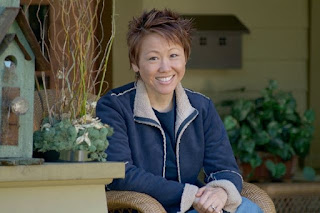 What can I say about Lisa Yee, that most people don't know already? She has fun contests on her blog, she finds a way to meet incredible people and manages to infuse humor in the most difficult of circumstances. Even her little Peepy has a better social life than I do. Sigh.
What can I say about Lisa Yee, that most people don't know already? She has fun contests on her blog, she finds a way to meet incredible people and manages to infuse humor in the most difficult of circumstances. Even her little Peepy has a better social life than I do. Sigh.
Lisa has written some wonderful books for middle grade readers: Millicent Min, Girl Genius; Stanford Wong Flunks Big Time; So Totally Emily Ebers; and Good Luck Ivy.
Side note: Millicent Min, Girl Genius was even on the sixth-graders' reading list (of my local middle school) this past summer! Kids are on waiting lists to read about Millicent Min and Stanford Wong. How cool is that!
Millicent Min, Girl Genius is Lisa's Yee's first book. What a great book! You have to love a brilliant, geeky, socially incompetent girl who figures out a way to get back at a bully and just wants to be like other girls her age. In this book, Millicent learns about loyalty, friendships, and being comfortable with who she is from her new friends, Emily Ebers and Stanford Wong. Brilliance never looked so fun!
Check out all of Millicent's awards! Sid Fleischman Humor Award 2004; Publishers Weekly Flying Start; CCBC Choice Bank Street Book of the Year 2004; International Reading Association Children's Choice; 2005-2006 Texas Lone Star List Nominee; The Young Hoosier Book Award Nominee; Georgia Book Award Nominee; Garden State Book Awards Nominee; Pennsylvania Young Readers Choice Award Nominee; Nevada Young Readers Award Nominee; Nene Award Nominee (Hawaii); Insinglass Teen Award Nominee (New Hampshire); Young Reader's Choice Award Nominee - Pacific Northwest Library Association; South Carolina Junior Book Award Nominee.
Stanford Wong Flunks Big Time has been recognized as a ALA Best Book for Young Adults; CCBC Choice; Chicago Public Library "Best of the Best"; Chinese-American Librarians Association Best Book Award for Youth. Stanford finally realizes how easy he has it--He has a girlfriend who doesn't care what he looks like, dresses like, or thinks like--as long as he is honest with her and true to himself?
I adored So Totally Emily Ebers and was surprised at the depth of emotion Emily had in the book. So different from how she appeared in the Millicent Min and Stanford Wong books. As a sidenote, there was a brand of designer clothes in So Totally Emily Ebers that sounded so familiar, and since I had the opportunity to ask Lisa, I had to ask her about the name. She confirmed the origin of the name--an author pal--and now you'll have to read the book to figure it out! Hee, hee. I was inspired to create a contest about this, A Shout Out to All the Wonderful Authors Out There Contest, and had it posted here, but forgot about the long holiday weekend and all. So, look for this contest next week...
It is with much pleasure that I welcome Lisa Yee to my blog. You are going to love what she has to say.
------------------------------------------------
HWM: What was the most difficult part of writing from each of these three voices--Millicent Min, Stanford Wong and Emily Ebers?
Lisa: It was actually easy to write in three voices, once I found my groove. Because I wrote MILLICENT first, I already knew the characters of Stanford and Emily for their books. However, the depth of their emotions/heartache did surprise me.
I guess the most difficult part was actually technical. I had to make sure that in the overlapping scenes, the dialogue matched up, and that all the dates were correct, etc. It was sort of like plotting a mystery novel where everything must come together to be believable.
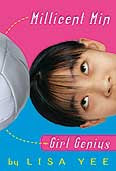 HWM: When you first started writing, was it difficult to find an agent or publisher who was interested in publishing books with an Asian protagonist? Do you think the marketing process is different?
HWM: When you first started writing, was it difficult to find an agent or publisher who was interested in publishing books with an Asian protagonist? Do you think the marketing process is different?
Lisa: I didn’t have any difficulty. However, most of that credit goes to being with Arthur A. Levine Books/Scholastic from the outset. Arthur discovered me from the slush pile. There was never any discussion about Millicent Min being Asian. It’s just who she was. Although the plot changed several times, her ethnicity never did.
Marketing-wise, I was so pleased that her being Asian was not an issue, nor was it the selling point of the novel. This was a book about an 11-year old genius who was lonely, quirky, and funny (although she was not aware of any of these things). It was positioned as a realistic contemporary fiction, which it is.
HWM: When did you know you had the right ending for each of these books?
Lisa: I always write my endings first and then write my way toward them. It’s always the first 50 pages that cause me the most difficulty. So I overwrite and then cut, cut, cut away.
HWM: Which character, if any, is most like you?
Lisa: I’m sort of a little Millicent-y in that I got really good grades in school and would have probably passed out if I got less than an A. But I was social, like Emily. I was nothing like Stanford, although do have a boy’s sense of humor and am not easily grossed out.
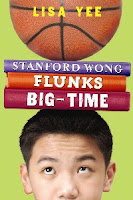 HWM: What did you learn from writing from a teenage boy’s point of view?
HWM: What did you learn from writing from a teenage boy’s point of view?
Lisa: I learned that the emotions boys have are not all that different than girls’-- it’s just that the way they communicate is different. Boys tend to hold things in. Girls talk them out. Of course that all changes when we become adults . . . NOT!!!!
HWM: Who was the toughest character to write about?
Lisa: Of all my characters, Digger was the hardest. He’s Stanford Wong’s friend/enemy. Digger is such a mean negative guy. But I hinted at his home life with a father who hit him. I didn’t want to make him one-dimensional, and wanted to explore why bullies are the way they are. Quite a few kids picked up Digger’s vulnerabilities and have commented on it to me.
HWM: Tell me about your experience as The Thurber House Writer-in-Residence.
Lisa: Ah, such a wonderful time. The Thurber House is in Columbus, OH and it is the boyhood home of author James Thurber. The house is a museum, but the attic has been transformed into a two-bedroom apartment . . . all for the writer-in-residence! I taught at a homeless shelter, and at the Thurber Writing Camp, for a few hours a week. The rest of the time, I wrote. Well, wait. That’s not entirely true. I did fall on my face while running and was privy to the inside of a hospital emergency room. And I did do some hobnobbing with other authors, bloggers, ghosts and literary-types.
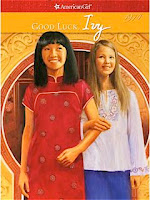 HWM: How much research was required to write the American Girl novel, Good Luck Ivy? Will you be writing more books for Ivy?
HWM: How much research was required to write the American Girl novel, Good Luck Ivy? Will you be writing more books for Ivy?
Lisa: American Girl provided a researcher/historian, so any questions I had I could ask him. (How cool is that!?!?!!) I did go to San Francisco though. It was mostly to soak up the atmosphere. I walked around the areas Ivy lived. I visited Chinatown and ate at restaurant similar to the one I imagined her grandparents owning. And, of course, I had to go to Ghirardelli Square to sample the ice cream and chocolates since I made sure that was in the book. Ah, what we do for research!
As for writing more Ivy Ling books, there are no others planned at this time.
HWM: I understand you have a few new books in the future. What can you tell me about them?
Lisa: I’ve got a young adult novel called DEFINITELY MAYBE coming out in fall 2008. It’s about a goth girl from Florida whose mother runs a charm school for beauty pageant contestants. Some really bad stuff happens, and Maybe (short for Maybelline – she was named after her mother’s favorite mascara) runs away from home. She ends up in Hollywood looking for the father who doesn’t know she exists.
I also have a couple of chapter books coming out in 2009 and 2010 called JUST BOBBY. It’s about a very sincere, accident-prone boy who’s trying to navigate though his chaotic family life and the fourth grade. All these books are with Arthur A. Levine Books/Scholastic.
 HWM: It’s one thing to be funny in real life; it’s another to be able to convey the humor in writing. What secrets can you share for writing with humor?
HWM: It’s one thing to be funny in real life; it’s another to be able to convey the humor in writing. What secrets can you share for writing with humor?
Lisa: Be aware of your punctuation.
? . : ; !!!!
Really though. It’s all pacing. And some other stuff. I don’t think about being funny when I write. It just sort of comes out. I believe that in some ways our writing can mirror out views on life. My teenaged daughter is always saying (and not as a compliment), “Geez, mom, you’re always cracking yourself up.”
I like to laugh, so that spills over into my work.
HWM: Do you feel pressure to be on…to be funny, all the time? What do you do to alleviate the pressure?
Lisa: One time, when I was in high school, my date said, “Everyone says you’re funny. So say something funny.”
That was the quickest way to get me to clam up.
These days, I’m just myself. Sometimes funny. Sometimes strange. Sometimes sad. Whatever. Whatever. Or not. Or more.
HWM: What has been your most rewarding experience as a writer?
Lisa: Some letters I receive are so touching. And then when I get to meet my readers in person, it is just so heartwarming. I love it when a fan approaches me with one of my books, all bookmarked and worn from reading. Lovely.
HWM: Do you outline or free form?
Lisa: Outline. Always.
HWM: Where do you like to write?
Lisa: I write on the road when I have to. But my favorite place is in my office, surrounded by all my stuff. I’m not one of those people who can write in a coffeehouse. I don’t like people looking at me when I write. If someone is standing behind me when I am typing they may as well hit me over the head with a hunk of smelly cheese--it’s that discombobulating.
HWM: What is your writing process or ritual?
Lisa: I need big heavy chunks of uninterrupted time to write. Probably because my warm-up routine takes so long. First I have to peruse the NY TIMES online, then Drudge Report, then NY Post, and of course, the billions of blogs. Once my head is filled with news, and I know I’m not missing anything, I can get to work. Only then, it’s usually time for a snack.
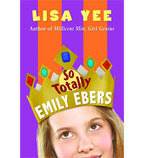 HWM: How do you think of your contest ideas?
HWM: How do you think of your contest ideas?
Lisa: They usually just smack me in the side of the head. I think I’m due to have one in a month or so.
HWM: What has been the biggest surprise of your writing career?
Lisa: The amount on non-writing I do. This year in particular I’ve been on the road a lot. I had no idea this was part of being an author!
HWM: If you could share any unique writing tip to aspiring writers, what would it be?
Lisa: Assign a word to your main character. Then constantly refer back to that word when you are working on that book. For example, Millicent Min’s word was “lonely.”
HWM: What was the best writing advice someone ever gave you?
Lisa: To paraphrase Anne Lamott because I am too lazy to look it up, she once said something like, “Don’t be afraid to write sh*tty first drafts.”
HipWriterMama's Curiosities
HWM: Tell me about the most interesting comment from a fan.
Lisa: There’s a character in Stanford’s book named Marley. Marley’s a kid who’s practically invisible and has no friends. When I was speaking to a large audience, a boy stood up and said, “I need to know what happens to Marley.”
Later, his teachers told me that the boy was exactly like Marley, and never spoke. So for him to stand up in front of about 300 other students was a very brave thing of him to do.
HWM: Why do you blog?
Lisa: For fun and because I use my blog as a writing journal. I print out my blogs and keep them in a binder to remind myself of where I’ve been and what I’ve been up to.
HWM: How much time do you take to write one of your posts? -- What is your favorite post?
Lisa: Each post takes less than an hour to write. However, all uploading/downloading those photos and links are what take up all the time. I don’t have an all-time fav post. Recent ones I like though are when Son got to meet JK Rowling, or when author Mary Calhoun read my Horn Book essay, or when I blow up Peeps, or when . . . oops, better stop now.
 HWM: How’s Colin Firth?
HWM: How’s Colin Firth?
Lisa: J -- That’s too personal to get into here.
HWM: Peepy or Sock Monkey?
Lisa: Yes.
HWM: If you found a way to go back to your teen years as one of your characters, what would you do differently?
Lisa: I’d spend less time on my hair.
HWM: What makes you laugh?
Lisa: My kids.
HWM: If you were a superhero, what powers would you want and why?
Lisa: The power to take five-minute nap on command and wake up refreshed.
-------------------------------------
Other Places to find Lisa Yee:
Lisa's website
Lisa's LiveJournal
Lisa's MySpace
Excerpt from Millicent Min: Girl Genius, Arthur A. Levine Books, 2003
Excerpt from Stanford Wong Flunks Big Time, Arthur A. Levine Books, 2005
Excerpt from So Totally Emily Ebers, Arthur A. Levine Books, 2007
--------------------------------------
Today's WBBT Interviews:
Loree Griffin Burns at Chasing Ray
Lily Archer at The Ya Ya Yas
Rick Riordan at Jen Robinson's Book Page
Gabrielle Zevin at Seven Impossible Things Before Breakfast
Dia Calhoun at lectitans
Shannon Hale at Miss Erin
Jane Yolen & Adam Stemple at Shaken & Stirred
Alan Gratz at Interactive Reader
Lisa Yee at HipWriterMama
David Levithan is one of Not Your Mother's Book Club's favorite authors. He even helped us celebrate our first anniversary with an awesome event, featuring David, Rachel Cohn and E. Lockhart. (That evening won the award for "most numerous and creative uses of the word F*¢K in a bookstore", and that will also go down in history as "that time that Jennifer kicked a Newbery Honoree and her children out on the street"-- sigh.)
David kindly agreed to take a brief respite from his hectic life as a bestselling author & editor extraordinaire and answer some of my questions. Yay!


 I know that lots of NICK & NORAH fans were thrilled to find out that you were working with Rachel Cohn again for NAOMI & ELI. What are the good and challenging parts of writing a novel in conjunction with another author?
I know that lots of NICK & NORAH fans were thrilled to find out that you were working with Rachel Cohn again for NAOMI & ELI. What are the good and challenging parts of writing a novel in conjunction with another author?Well, when it works (and with Rachel, it definitely works), the energy just ricochets from one person to the other, and that makes writing so much more exciting (and mysterious). I love not being in total control of the story and the characters, and having to take it one chapter at a time. The challenge, of course, is finding someone who shares your writing wavelength; with me and Rachel, there was as much writing between the lines (hints and clues, dares and kudos) as there was in the lines itself. Sometimes we got what was between the lines… and other times we went off on our own tangents. Every time Rachel and I talk about our books, we find out something new about what the other person wrote.
I just got a surprise in my mailbox - a galley of your NEW-new book, which is coming out in January. You want to tell us about it?Well, my next book is one that you could say I’ve been working on for twenty years – it’s called HOW THEY MET, AND OTHER STORIES, and it includes things that I wrote way back in high school, right up to today. I guess I’ve always been interested in the way people fall in love.
Romantic! I think HOW THEY MET will be a wonderful Valentine's day book. About the writing of it - do you find it easier to write short stories than novels, or more difficult? Do you approach writing them differently?Thanks! Many of the stories came out of my Valentine’s Day story tradition, so that makes sense.
I really don’t approach stories and novels that differently – I just sit down to tell the story, and the story itself ends up dictating the length.
Boy Meets Boy,
The Realm of Possibility, and
Are We There Yet? all started as short stories that grew longer and longer until they were novels. And certainly there are a few stories in How They Met that could eventually become novels. And others are exactly what they should be; I couldn’t take them any further.
What book has been the most fun for you to write, and why?Hard question! But the answer would have to be NICK AND NORAH’S INFINITE PLAYLIST. Rachel and I had so much fun with it – mostly because of our disbelief that a collaboration could be so effortless.
Do you think that being an editor has made it easier for you as a writer, or are you even more critical of your own work than most authors are?I think it has made it easier, in a way, because I spend my whole day with words, and that has to rub off on how I use them in my own writing. There is no way that I would’ve written
The Realm of Possibility if I hadn’t been immersed in editing poetry by Billy Merrell and Eireann Corrigan. It would’ve never occurred to me to use those linebreaks.
As for being critical – strangely enough, I think I’m easier on myself than many other writers. I guess I know how hard it’s supposed to be, so any time I get something right, I’m a little amazed. And I would never, ever claim to be able to edit my own work. I need an editor as much as anyone else, and luckily I have a great one (Nancy Hinkel).
You throw lots of cool events in NYC. How did that get started? What's the next one? We’re really lucky, because so many fantastic writers live in New York. The funny thing was that we were seeing each other more at conventions in cities like Indianapolis than we were at home. So we decided to change that.
I’m really excited by the monthly Teen Author Reading Night I host at the New York Public Library – we even have out-of-town authors come to participate. Our next one is going to include Scott Westerfeld, Kristen Kemp, and Jake Wizner. It should be a blast.
Lots of people say that this is the "golden age of YA," and indeed, I think there have never been as many great books out at the same time as there are right now. Do you see the YA market continuing to grow? What kind of books do you think we'll be seeing more of in the near future?I think the golden age is going to continue for a good long while, because we’re constantly emboldened to be adventurous in our writing. It’s a very exciting time.
As an editor, reading manuscripts, what makes you stop and say I MUST PUBLISH THIS?Usually, it’s the size of the check that comes with the manuscript. Just kidding. I think it’s a compelling voice, a fascinating story, and/or something I feel I’ve never read before. No pressure.
Ha! OK, I know this is a hard question, but -- who are your favorite authors? Do you collect books by any authors? It’s a very hard, somewhat impossible, question! I’ll skip to the second part – I probably have every Anne Tyler, Alice Hoffman, Fay Weldon, and Elmore Leonard book ever written – they were among my first loves. And I think Virginia Euwer Wolff’s
True Believer is as close to a perfect book as we have.
Is there anything you wish I had asked, but I didn't?I wish you’d asked me what I was wearing. Oh, well.
Well, kids, you'll have to use your imagination on that last one. Thanks so much for joining us, David, NYMBC loves you!Visit David Levithan at
his website, or friend him on
MySpacePre-order HOW THEY MET, or get any of David's terrific books,
from a very sweet and pretty independent bookseller.And of course, be sure to check out all the rest of today's WBBT interviews:
David Mack at
Chasing RayPaul Volponi at
The Ya Ya YasEllen Emerson White at
A Chair, A Fireplace and A Tea CozyJack Gantos at
Seven Impossible Things Before BreakfastMicol Ostow at
BildungsromanElizabeth Knox at
Shaken & StirredLaura Amy Schlitz at
Miss ErinKerry Madden at
Hip Writer MamaSherman Alexie at
Interactive Reader
Ellen Emerson White is the author of Long May She Reign, a book I've included in my Best Books of 2007 (see sidebar). Readers may remember that I highlighted Ellen's books in my Under The Radar sequence this summer. You can imagine how happy I am that Ellen agreed to an interview for the Winter Blog Blast Tour!
As you read, you can see why I adore Ellen's books; as in her interview, they are a mix of serious and humor. I also found it interesting to think of Long May She Reign as a post 9/11 book, even tho 9/11 itself is not a factor in the book.
And someone who loves Buffy and Battlestar Galactica? And lives in New York City and is a Red Sox fan? How can you not love Ellen Emerson White? And it's not just me! Publishers Weekly included Long May She Reign in their Best Books of 2007. See the full PW starred review here.
Liz B: Your new book, Long May She Reign (October 2007), features Meg Powers, a character introduced in three books published in the 1980s, The President's Daughter (1984), White House Autumn (1985), and Long Live the Queen (1989.) Please tell us a bit about Long May She Reign.
Ellen: The book is very, very long--so, if you have orthopedic issues, please consult a medical professional before attempting to lift it.
It picks up approximately three months after Long Live the Queen ends. Since I am Not Very Bright, the earlier books are quite solidly set in the 1980s, or--to put it less politely--they are extremely dated. Which is why I am currently re-typing them, to bring them up to the near-future, since Long May She Reign clearly exists in a post-Bush world. All three of them are going to be reissued next spring.
As the book opens, Meg is not doing very well. (She said, with extreme understatement.) Her parents' marriage seems to be falling apart, her brother Steven is falling apart--and Meg has already fallen apart. So, all is not well at 1600 Pennsylvania Avenue. Obviously, she's in tough shape psychologically, but she also hasn't healed from her injuries--and, it's clear, is never going to have anything close to a full physical recovery.
Everything is looking pretty hopeless, and since she really doesn't have any other options, or much prospect of ever leading a normal life, she ends up deciding to go away to college, after all--in lieu of staying in her bedroom permanently. And college turns out to be very difficult--but, interesting.
In case that all sounds too bleak, I must stress that there are jokes, also.
Liz B: Your fans have been waiting for a new Meg book since 1989. Why revisit Meg now? How did you get back into Meg's head?
Ellen: There are a lot of reasons. My own life took some unexpected twists and turns, which changed the way I look at things--and if you're a writer and you don't try to address that through art, you are in the wrong profession. Also, I'm a New Yorker, and I was here on 9/11--and there's no getting around the fact that the entire world as we know it is different now. I think this is a very much a book about people waiting, uneasily, for the next bad thing to happen--and I'm sure 9/11 plays into all of that, somewhere.
Plus, sometimes you want to write a book which is just too hard to write. It took me 3 1/2 years--to the exclusion of everything else--which was a great gift creatively, but maybe not the wisest choice from a practical "pay the rent" standpoint. As a reader, I am often frustrated by writers who seem to write the same book over and over--and I really enjoy writers who absolutely swing for the fences and try to be as ambitious as possible, even if the finished novel is--short of perfection. (The Virgo in me wants to faint when I type those words.) Long May She Reign was a tremendous challenge, because I wrote the best book that I am capable of writing. 110% effort. Left it all out on the field. All of those good sports cliches. But, it's a little disconcerting to realize that you have absolutely exhausted the full extent of your abilities--and that the book is still flawed. But, what can you do?
I thought I had grown out of Meg years ago--but, no, she popped right back into my psyche in about a second and a half. The voice, the rhythm, the mind-set--all of it. And she is just as grouchy as ever. I thought that Rebecca, the lead character in a couple of my other novels, was my true alter ego--but, writing about Meg just felt like coming home.
A character from my very first novel (not a great book, but I was only 18) is a major character in this novel, and to my surprise, Susan (a less well developed character originally, and certainly much less likeable and approachable) also came back as soon as I started typing. She and Meg are an absolutely combustible mix, and that aspect of the book was really fun to write.
Liz B: Politics have always played a big part in the Meg Powers books, what with Meg being the daughter of the first woman President. But the media is also a huge part of Meg's life, especially now that she is no longer famous just for being "daughter of." What are your thoughts on today's media, and teens caught in the spotlight?
Ellen: An eleven year old I adore refers to everyone over 18 as "an elderly dude"--and sometimes, I think she might be right. The Internet has changed everything--especially, it seems, people's grasp of the concept that there is such a thing as Too Much Information.
But, given Meg's inherent New England reserve--and the fact that she has always had to be so very careful every waking moment of her life--makes it easier to fit her into this new world, without having to change her at all, really.
The media has become omnipresent, and often, irresponsible--but, I can't really complain
since I read the New York Post regularly, and watch American Idol, and just generally participate in the fun of tabloidization. So, I'm nowhere near the moral high ground on this subject.
It's very sad that so many starlet types in the public eye (especially a Lindsay Lohan, who is
actually talented) are crashing and burning, but sometimes, I think they're so addicted to the fame and attention, that they're embracing the constant coverage and exposure, despite the fact that it mostly makes them look ridiculous. Even Andy Warhol might be flummoxed by today's media climate.
That said, I have to wonder where all of their parents are. A rich and famous teenager is still a teenager. It would be nice to see them get a little sensible, adult supervision.
Insofar as the book is concerned, I think Meg's father is a tremendous grounding force in their lives. He's a much more complicated (and sometimes less nice) man than he may appear to be, but there's no question that he is doing everything he can to try and help his children lead something reasonably close to normal lives.
Liz B: Let me be the first to say, I would vote for President Katharine Powers.* (I'd also vote for Laura Roslin, but I don't think they would be running against each other.) I love the insider look at politics; but I also am a bit in awe about the character that is Katharine Powers; meaning, not just who she is but how you portray her. Can you talk a bit about her as a character?
Ellen: Wouldn't Katharine and Laura have one hell of a debate? I'd pay to see that.
When I originally finished the President's Daughter, I was only twenty. The President is much easier to write, now that I'm very close to being her age. She makes sense to me, in a whole different way.
The irony is, that she's actually a wonderful, loving parent--although she gets no credit from anyone--including herself--for being one. I would love to write a book from her point of view, but there are only 43 Americans who would be capable of doing that effectively, and only four of them are still alive, so I guess it's not going to happen. Boy, I'd love to do that book, though. The only way I could ever use her as a main character would be if I wrote a book which takes place when she's Meg's age--and, I don't know. It would be a challenge, but the idea is not without appeal.
I'm blessed in Long May She Reign, since about twelve different characters would be capable of carrying their own books--and I can't imagine what it would be like to see Meg from someone else's point of view. Steven, and Susan, are both viable possibilities for that, though.
But, the President. Hmmm. I love the President. I love it that I genuinely believe that she would have no trouble running the world--but that she is also a very nervous and apologetic person. Well-meaning. Insecure. Sensitive. But, I also like it that she's arrogant, and short-tempered--and has that ruthless, ice-cold streak which surfaces every now and then.
I think that she and Meg mirror each other in so many interesting ways--and yet, Meg is also so very much like her father. Actually, all three of the children are such complicated mixes of their parents--and it was a happy surprise for me when Neal leaped out of his former "I am a cute child" persona in this book, and became a full-fledged, quite pivotal, character, in his own right.
This doesn't really answer any questions about the President, though, does it? She's--elusive. Even for me.
Liz B: Tea Cozy readers are fans; and as fans, they are curious about the creative process. You've written over 25 books, covering everything from picture books to adult mysteries. How does the writing process differ for the different books you write? While writing Meg Powers, for instance, was it a challenge that in earlier books Meg was drinking TAB and watching Hill Street Blues and now she's surfing the 'Net and has an iPod? (And as a total aside, I just saw that Hill Street is now available on DVD. Yay!)
Ellen: Sadly, only the first two seasons of Hill Street are out now, I think--but, maybe the others are coming soon.
I can't really explain my process, because I fall into the idiot savant category--with a very heavy emphasis on the "idiot" part. It's very similar to sports, really, because the minute
you start thinking too much about how you do it--you can't do it anymore.
If I suddenly became independently wealthy, I would spend the rest of my career writing an adult novel every two or three years (spending that entire period working; not lounging about, eating Doritos), and never do anything else. But, as a Buddhist once said in a book I read (I paraphrase), there's nothing wrong with living in the moment--but, you should still open an IRA. Which, in the early 21st century, sums up a novelist's life pretty accurately.
I like some of the books better than others, and some of them are written under pseudonyms--for a reason. And, in some cases, I regret the pseudonyms, so it's a complicated mix for me.
Liz B: Not to be all greedy, considering that the new book is a brand new book, arriving in stores in October. But, can you share with us any current writing projects?
Ellen: I just finished re-typing the President's Daughter, and am on a very short deadline
to do the same with the other two. Back in the day, I used an actual typewriter for those books, so they don't even exist on a floppy disk or anything.
It's very strange to revisit one's twenty-year-old writer self, I must say. I'm not changing anything at all--they are the exact same books), but some of the anachronisms just had to go. Sadly, Meg no longer drinks Tab--she drinks Coke. What can you do? And I assume Coke isn't going anywhere. I didn't feel like changing the TV shows--but now, she's watching them on DVD, and considers them "old." The Internet didn't exist in the first three books--but,
obviously, it does now. That kind of thing. And I think that the President is sort of a "Barack Obama with experience" type. Youngish, attractive "rock star" of a candidate, who you just know must have given the keynote address at an earlier Democratic convention--and leaped into the national spotlight. It makes perfect sense to me that she's someone the Party would have gotten behind--because I would, too.
After that, I'll be doing some less demanding works-for-hire (NYC is expensive!), and then, I have to do the long overdue second adult mystery. Around the time that the first one came out, my life was unexpectedly derailed for a few years--and it's been a challenge to find a way back to that group of characters. Many of my loved ones have said that they think Dana is more like me than any of the other characters I have ever written--but I disagree, since from a writer's perspective, she's so very polite and private that even I find her a bit impenetrable.
Liz B: On to the pop culture; and with this blog being named for a Buffy quote, you knew there would be some pop culture talk. Battlestar Galactica. I never expected to fall so in love with BG, especially since I loved the original. (In my defense, I was 12.) TV sure has changed since The Brady Bunch! What are some of your favorite shows?
Ellen: I don't even know what a tea cozy is--but I want one. (I pretty much have the entire series committed to memory--and think Giles may, in fact, be the Ideal Man.) Firefly never really worked for me, but I had a lot of fun with Angel, even though I think it was a mistake to turn Cordelia into an otherworldly being.
And, "Going Through the Motions" was the best song in the musical, I think.
I love Battlestar Galactica, and am delighted by the way to which gender is entirely irrelevant, insofar as the characters treat one another. I didn't find the show until its second season--but, I adore Laura Roslin, to the degree that I even (gulp) blogged about her.
Mostly, I watch the Red Sox (and the Patriots), and CNN, and C-Span--because I am very, very boring--but I never miss American Idol, to which I was introduced by two evil and manipulative children who got me hooked on what I consider to be television crack. (and yet, one does not want to hear an eight year old happily telling people in a crowded elevator precisely that--and realizing that he is directly quoting someone who should have let her inner-edit button
operate before popping out with that one.)
It was very wrong that Melinda Doolittle didn't win.
I thought Martin Sheen and Stockard Channing were wonderful--but had very mixed feelings about the West Wing. Once Buffy went off the air, I no longer had a show To Love--so I was very happy to find BSG. (actually, I thought the final seasons of Buffy were extremely problematic--and that no villain ever measured up to my beloved Mayor, but it was a great, great show.)
And I love, love, love the Emma Peel episodes of the Avengers. No one has ever been cooler--or ever will be.
Liz B: Thank you so much!
Winter Blog Blast Tour for Thursday:
David Mack at Chasing Ray
Paul Volponi at The Ya Ya Yas
Elizabeth Knox at Shaken & Stirred
Ellen Emerson White at A Chair, A Fireplace and A Tea Cozy
Jack Gantos at Seven Impossible Things Before Breakfast
David Levithan at Not Your Mother's Book Club
Micol Ostow at Bildungsroman
Laura Amy Schlitz at Miss Erin
Kerry Madden at Hip Writer Mama
Sherman Alexie at Interactive Reader
and as Wednesday somehow disappeared:
Lisa Ann Sandell at Interactive Reader
Christopher Barzak at Chasing Ray
Julie Halpern at The Ya Ya Yas
Micol Ostow at Shaken & Stirred
Rick Yancey at Hip Writer Mama
Jane Yolen at Fuse Number 8
Shannon Hale at Bookshelves of Doom
Maureen Johnson at Bildungsroman
David Lubar at Writing & Ruminating
Sherman Alexie at Finding Wonderland
*Meg's mother.
**The president in Battlestar Galactica.
Micol Ostow is a writer, a student, a runner, a dog owner, a Scrabble enthusiast, and a Reese's Peanut Butter Cup. Yes, you read that correctly. Now read the interview to find out how she manages to juggle it all.
You drew upon your Puerto Rican and Jewish heritage to
write Emily Goldberg Learns to Salsa. Tell us more
about the story, and what else you and Emily have in
common.
That's a good question! I think that because Emily and I share similar cultural backgrounds, people expect the story to be much more autobiographical than it actually is. Like Emily, I was raised Jewish (my mother converted before she married my father), but I have more contact with my Catholic family than Emily does. My mother's mother passed away a few years ago, and while it was very traumatic and emotional for all of us, as a catalyst, it sort of functioned exactly the opposite of Emily's grandmother's death.
When Emily's grandmother dies, Emily feels a sharp disconnect from her mother's family. When my grandmother was dying, though, our family came from all over (Florida, New York, Puerto Rico, and more) to be with her, and I was truly shocked to see how easily we banded together, despite the fact that some of us had never even met before! So that was very inspiring and comforting, and I think it's an experience that Emily finally comes to by the book's end, but maybe my road was a little more smoothly paved than hers, despite the sad events that set everything in motion.
You contributed a short story entitled First Last Kiss
to the anthology First Kiss (Then Tell), which comes
out in December. Is it fully autobiographical?
Not at all! Well, maybe a little bit. I definitely drew on the experience of that heartbreaking last kiss with a boyfriend or a crush, which of course, you never know is the going to be the last kiss at the time. Then afterwards, when you're replaying it, you torture yourself with a billion different scenarios of how much more dramatic and important and final you would have been, if only you'd known it was going to be your last chance or last memory.
But I'll leave it to you to identify the places wherein I took some poetic license. ;)
You have ghostwritten many titles. Would you encourage
hopeful writers to accept ghostwriting opportunities or to
pursue their own original fiction?
Ghostwriting has been very good to me! My first freelance gig was a novelization for the tv tie-in series "American Dreams," and it was a crash course in how to maintain some semblance of creativity when you're literally working straight from a script. Not to mention, the deadlines for mass-market series are brutal! As a former editor, as well, I can speak to the fact that series writing presents the additional challenge of requiring the writer to adhere to a series voice or style. That can be difficult even for the most talented of writers.
Writing for series -- whether it was "Buffy the Vampire Slayer," "Angel," "Charmed," or "Trollz," has been a fun way to keep my writing skills sharp in between original projects. Not to mention, it's nice to do something productive with my insane pop-culture knowledge!
According to your bio, you are "half student, half
writer, half chocolate, half peanut butter." Does this
make you a Reese's Peanut Butter Cup?
Exactly. Although I am on a white-chocolate Reese's kick these days.
In all seriousness, how much of your writing and your
studies overlap?
I think the only time that they
don't directly overlap is when I have a grad school "packet" (monthly chunk of work) due. That's when I hunker down into deadline mode -- no outside contact, no clothing with zippers or buttons, no food or drink that isn't caffeinated. But all of the work that I do at Vermont (Vermont College of the Fine Arts) intersects with my interests and my craft, and my advisers have been kind enough to work with me on some of the projects I have under contract. So I've got some great feedback from some very keen minds going into the work that I've been publishing lately. And the very best thing about grad school is how much I get to READ. As an editor, you're always drowning in manuscripts. But for school, I'm required to submit a monthly bibliography. So I'm finally getting to spend time curled up on the sofa with great YA. How is that "work?" But it is!
How did you get involved in Media Bistro's fall '08 YA Writing Course?
I took the course myself a couple of years ago, when the brilliant and talented Kristen Kemp was the instructor. I wrote the Emily pitch and the first ten pages of the manuscript in the class, and sold it before the semester ended. So I think they considered me to be a "success story" (and eventually they sponsored my launch party, which was great of them). Kristen's had three babies since then (!) and was looking to pass the torch, and now that I'm a full-time freelance, I finally have the time to take on teaching. So far, so good! The students are very talented, so they're keeping me on my toes.
What other works do you have on the horizon?
Right now I'm working on a fall '08 election-themed project for Scholastic that should be a lot of fun. It's about a small-town girl whose father is the town Mayor and whose boyfriend is the student body president. She goes head-to-head with her boyfriend in the school election, and learns that her father may have tenuous connections to her platform. But it's all very chick-lit-y and light. And due in five minutes, which is why my friends and family will tell you that I've dropped off the face of the earth of late.
I also have a hybrid-graphic novel project tentatively called I'M WITH THE TRIBE coming out with Flux in spring '09. It's the story of three yeshiva boys who start a garage band, while one of the bandmates discovers a hidden talent for art. As a former Jewish day school girl, this is a project that's been a long time in the making, and very close to my heart. Also, my brother is working on the illustrations, so I've had a crash course in collaboration. Keep an eye out!
Anything else you care to share?
Support your local libraries and independent booksellers! And read read read!
I agree! Thanks, Micol.
Visit Micol in person today at NYPL's Teen Central Jewish Book Month panel featuring Micol Ostow, Judy Goldschmidt, David Levithan, Sarah Mlynowski, and Lisa Ann Sandell
Thursday, November 8th at 4 PM
Donnell Library Center
20 West 53rd Street
(212) 621-0619
Visit Micol online at her website (I hope you like it!) and blog.
Read my previous interview with Micol.
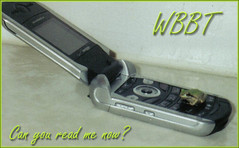
Today's WBBT Schedule
David Mack at Chasing Ray
Paul Volponi at The Ya Ya Yas
Elizabeth Knox at Shaken & Stirred
Ellen Emerson White at A Chair, A Fireplace and A Tea Cozy
Jack Gantos at Seven Impossible Things Before Breakfast
David Levithan at Not Your Mother's Book Club
Micol Ostow at Bildungsroman
Laura Amy Schlitz at Miss Erin
Kerry Madden at Hip Writer Mama
Sherman Alexie at Interactive Reader
Paul Volponi is a hard hitting writer who doesn’t pull any punches when it comes to his stories about teenagers growing up in the city. His protagonists are fraught with difficult decisions that determine the course of their lives. I had an opportunity to interview Mr. Volponi via email. To say the least I am inspired by his words in the interview and in his books. Paul Volponi offers hope through his writing to teens and young adult who find themselves in difficult situations. Definitely keep your eye out for Paul Volponi’s upcoming books: Hurricane Song and The Hand Your Dealt. His books will change your perspective on life and the way that you look at people and situations.
Your author biography mentioned that you worked at Rikers Island, how did you start working there? What did you learn from that experience?
I started working on Rikers Island because I lived so close to the jail. It was a time when there were many budget cuts in the NYC school system, and as a new teacher I kept getting laid off. A job popped open in the jail and nobody really wanted it. But I’d lived close to the jail all my life. People in cars would pull up to me on the street as I walked with a basketball tucked under my arm and ask, “How do I get to Rikers Island?” That could happen four or five times a week. It happened to most of my friends, too, because the jail is almost hidden off of an obscure avenue. None of us liked to be approached like that, so I came up with a smart mouthed answer. How do you get to Rikers?-Rob a bank! My friends would howl at that. But I could never use it on the people who really asked. They all seemed sad, embarrassed and lost. They were visiting someone they loved in jail and had to ask a stranger for directions. It never hit me that most of those people were black and Hispanic. But when I got a job teaching inside, and saw that 99% of the inmates were black and Hispanic, I couldn’t believe how unfair the justice system was to minorities. That became the basis for my novel Black and White.
What else did I learn there? I learned that the best teachers worry more about the students than themselves. And it takes some time getting used to the place that others can be your first concern. It was certainly one of the best experiences of my life and provided me with the strength to do certain things and write about what I’ve witnessed.
Your characters deal with serious situations, what advice do you have for young adults and teens in regards to dealing with a tough situation?
My advice to teens in tough situations is straightforward-Use your passion to motivate and inspire you, but don’t let your passion take away from your reasoning and self-control.
Your characters seem to keep secrets to their own detriment, is there a message you have about integrity? Peer pressure?
I don’t have any real messages for readers. I’m just a reporter writing down what I’ve witnessed. But I do think integrity is very special, and the characters I love and which you’re probably rooting for in my work have lots of it.
Your characters break down racial boundaries by having common interests like Marcus and Eddie in Black and White and Mackey and J.R. in Rucker Park Setup. Do you have any insight as to how to ease racial tensions in schools?
I’m not smart enough to have solutions to big problems like that. But I feel that my honest reporting will inspire others to tackle these problems which I spotlight in my work.
Which of your characters do you identify with most?
I suppose I most identify with Mackey, aka. Hold the Mustard from Rucker Park Setup because so many of his moments on the basketball court were written out of my own street basketball experiences.
Part of the appeal of your books is the realistic dialog. When writing do you consult with young adults and teens to make your characters’ conversations sound more authentic?
No. I actually live it. At 47, I still play hard-nosed street ball twice a week, and their dialogue is actually mine as well. Also, my work with teens in different programs keeps my ear sharp. But I grew up in the streets and never really left, so it’s very natural for me. And I’m quite proud of the rap songs, I Flow like a River and It’s Time for Cochran, which I wrote for Rucker Park Setup.
Could you describe your writing process? Rucker Park Setup changed perspectives rapidly, how did you get those layers in there?
The layers come from trying to mimic stray thoughts in our minds, that stream of consciousness that changes so fast but seems to have sprung from the same root. As a process, I try to write every day. Because so many scenes are merely sketches waiting to be fleshed out when I write them, I wonder how tied they are to the moment. And if I missed working today, would I have come up with the same guts for the scene tomorrow?
Do you have any books in progress?
Next year I’ll have two books out. Hurricane Song (Viking) is a novel about a teen and his jazz musician father who spend two hellish nights in the Superdome riding out Hurricane Katrina, before they make their way through the flooded streets and looters to see what’s become of their home. The Hand Your Dealt (Athenaeum) is about a high school teen who takes on his unscrupulous math teacher in a local poker tournament in an attempt to avenge a dishonor to his recently deceased father. The novel uses poker to examine life’s bigger losses.
Who are your favorite authors? Any book recommendations for teens?
I like Mark Twain, John Steinbeck, and Flannery O’Connor as authors, and Paul Simon, Neil Young, Tom Waits, Tom T. Hall and Towns Van Zandt as songwriters. I Think Steinbeck’s The Grapes of Wrath and Simon’s The Boxer are my two favorite works.
As a young adult librarian I go to schools and talk about books to middle and high school age students, if I could convey a message from you to them, what would that be?
I think my message to teens is that what they write is very important because it’s real and from the source. I value what teens write. It doesn’t matter to me if there are mistakes in it. I don’t want to give it a grade. I wish kids would value there own writing and thoughts more than anyone’s on radio, TV, or a library shelf. We’re all part of the chain, and the things teens say and write are very important and worthy.
Thanks Paul!
Other WBBT interviews today:
David Mack at Chasing Ray
Elizabeth Knox at Shaken & Stirred
Ellen Emerson White at A Chair, A Fireplace and A Tea Cozy
Jack Gantos at Seven Impossible Things Before Breakfast
David Levithan at Not Your Mother’s Book Club
Micol Ostow at Bildungsroman
Laura Amy Schlitz at Miss Erin
Kerry Madden at Hip Writer Mama
Sherman Alexie at Interactive Reader
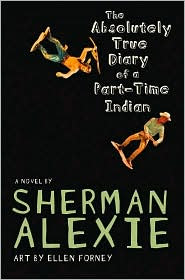 My Grandmother's 90th birthday was in June. I tell you this because it was while on that three hour car trip north (I had already flown 2,000 miles) to her party when I finished Sherman Alexie's first novel for teens. I had purloined the ARC of The Absolutely True Diary of a Part-Time Indian from the collection development librarian. As I closed the book, I observed a moment of silence, thought, "Wow. That was amazing," before turning to my cousin Mike (trapped in the backseat with me, behind our mothers) and saying, "This book isn't out yet, but this fall, when it is? Mike, you HAVE to read it. You'll love it." Being the youngest sibling of 9, he is a bit skeptical and remarked that he'd never heard of the author (this was Michigan; Alexie isn't quite as well-known there as he is in the NW. In the NW, his name is met with a pause of reverence before sentiments of adulation fall from mouths). I told Mike that he would hear of him, and to trust me.
My Grandmother's 90th birthday was in June. I tell you this because it was while on that three hour car trip north (I had already flown 2,000 miles) to her party when I finished Sherman Alexie's first novel for teens. I had purloined the ARC of The Absolutely True Diary of a Part-Time Indian from the collection development librarian. As I closed the book, I observed a moment of silence, thought, "Wow. That was amazing," before turning to my cousin Mike (trapped in the backseat with me, behind our mothers) and saying, "This book isn't out yet, but this fall, when it is? Mike, you HAVE to read it. You'll love it." Being the youngest sibling of 9, he is a bit skeptical and remarked that he'd never heard of the author (this was Michigan; Alexie isn't quite as well-known there as he is in the NW. In the NW, his name is met with a pause of reverence before sentiments of adulation fall from mouths). I told Mike that he would hear of him, and to trust me.
I don't know if Mike followed my advice; I haven't talked to him. However, True Diary IS amazing, and when brainstorming in August about which authors to interview for this week, Alexie came up. Somehow, I got so lucky, and the now the National Book Award Finalist? Yeah. Here on the blog. Unfreakin' believable, right?
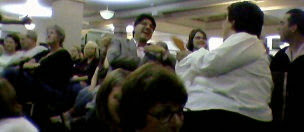 1. Congratulations for being a finalist for the National Book Award! What were you doing when you heard the news? What was your reaction?
1. Congratulations for being a finalist for the National Book Award! What were you doing when you heard the news? What was your reaction?
I was asleep in a Miami hotel room when I got the phone call with the news. I was sleepy and stunned, and ended up being late for a high school appearance. I think I forgot to brush my hair!
2. The Absolutely True Diary of a Part-Time Indian is your first title for teens. Did you set out to write for that audience? If yes, why? Do you plan on writing more?
My adult books have done well with young adults and their teachers and librarians, so I was often asked to write specifically for them. But I never had the right idea until now. And yes, I plan to write many, many more. Dozens!
3. Do you feel that your process or approach was at all different when writing for a younger audience? Do you feel you toned any of your content down?
The only metaphor I have for this process is that my first draft was an adult book, and that my editor and I took fine gauge sandpaper to it, and over the course of a year, we polished it into a YA title.
4. Zits, from Flight, and Junior from True Diary, are roughly the same age. Other than the level of violence and language, what makes one story for adults and the other for teens?
In Flight, Zits drops into the bodies of adults and becomes concerned with adult situations and sensibilities. He might be a teen but all that is secondary to his possession of adult bodies.
5. The opening salvos of True Diary reads almost like a comedy routine. It's self-deprecating and bemoans the treatment and attitudes toward Native Americans. Why choose comedy to share these sentiments?
The simplest answer is this: the two funniest groups of people I've ever been around are Indians and Jews. And so there must be some inherent connection between genocide and humor. I haven't spent a lot of time around other genocided peoples, but I assume they're funny, too.
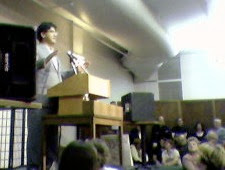 6. True Diary seems to mirror your life in many ways - why did you decide to tell this story through fiction rather than through memoir?
6. True Diary seems to mirror your life in many ways - why did you decide to tell this story through fiction rather than through memoir?
I didn't want to be more self-aggrandizing than I already am. Ha!
7. Both Zits and Junior list The Grapes of Wrath among their favorite books. Is it one of yours, and what does it tell us about these two different characters who are both searching to reconcile their personal heritage with mainstream society?
Grapes of Wrath was one of the first novels I ever read, and its story of poor folks struggling to find a way while having to defend themselves against innumerable attacks, always resonates with me. The last image of the book, where Rose of Sharon, having lost her baby, still has enough love and grace to breastfeed a starving, homeless man, remains my single favorite moment in literature. As a person and writer, I can only hope to show that much love and grace for my fellow humans.
8. Junior is considered a traitor by some Spokane Indians, and brave by others for choosing to go to a school outside of the reservation. Junior considers himself a warrior (p91). Did you, or do you, experience these attitudes for leaving the reservation? How did/do you respond to those attitudes?
Well, most of the tribal folks who really hated me back then are dead now. So, in retrospect, I have much sympathy for them. Their hatred of me was really just a form of self-hatred. And I only wish I could have seen that then. It would have helped me through the tough and lonely days, and perhaps I could have found the wisdom and compassion to reconcile with my enemies.
9. Some of your novels tend toward the episodic and don't follow a strict linear chronology. How do you work with such a structure?
Well, I think Flight and True Diary are linear, unlike my other books. What are these two books linear? Well, I have a tough time writing novels, so I figured out that it's easier process if I write with a strict time- and plotline.
10. "I feel important with a pen in my hand. I feel like I might grow up to be somebody important" (True Diary p6). Did you share this sentiment when you were young? When did you discover that your writing could be a door to a different life? Was writing your lifeboat like drawing was Junior's?
Oh, God, no, I never thought I'd be anybody. I was just hoping to have a good job. In college, when I started writing poetry, I quickly discovered that people of all types listened to me. They paid attention. I loved that attention certainly but I also discovered that I could change people's minds and hearts if they were listening. So, yes, writing, at the age of twenty-one or so, did become my lifeboat and my attack ship!
11. "Poverty only teaches you how to be poor" (True Diary p13). How do your efforts as a writer seek to change this?
This is an impossible question to answer. As a writer, I'm not sure that I can change anything. I certainly can't do a damn thing about poverty. Well, I've written my family out of poverty, but, wow, I don't know who else has gotten out of poverty because of my books.
12. Ever read any of the romances Junior's sister Mary wanted to write? Why make Junior an artist and his sister the writer? Did you want to distance yourself from a character who already shared some circumstances with you?
Growing up, I read MANY Indian man-white woman romance novels. And my real sister loved those books and tried to write a few. So I was honoring the real Mary by making the fictional Mary a writer.
13. According to Junior, Salmon Mush is better than it sounds (p69). Do you have a recipe you'd like to share to prove this?
The quick version: buy a package of smoked salmon, microwave it, and toss it into a bowl of steaming hot oatmeal, add cold milk and sugar, and enjoy!
(Jac says: um...I'm not convinced. Sorry. But thanks!)
Sherman, thank you so, very, very much for taking the time to do this. Good Luck!
I apologize for the rather shoddy pics, I took them with my cell, from the floor, at a seriously packed appearance. But *I* took them, so I couldn't NOT include them, right?
For more Sherman Alexie, check out yesterday's interview with the girls at Finding Wonderland.
***
Thursday's Full WBBT schedule:
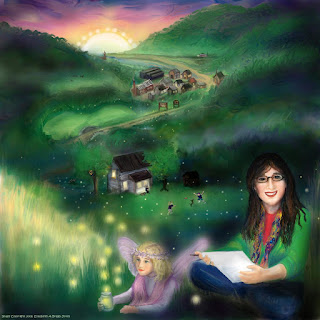 I love checking out author websites. It's my little way of peeking into an author's writing life and finding out a little more about the writer as a person. I know, I'm strange that way. Anyway, it was such a treat to explore Kerry Madden's website, which I pretty much think is eye candy.
I love checking out author websites. It's my little way of peeking into an author's writing life and finding out a little more about the writer as a person. I know, I'm strange that way. Anyway, it was such a treat to explore Kerry Madden's website, which I pretty much think is eye candy.
Kerry kindly agreed to an interview with me. When I asked her to send me an author photo to post with her interview, she sent me a copy of this lovely painting of her by illustrator Liz Jones that she has on her website. It made me so happy. Isn't it lovely?
Kerry has written four books (Offsides, American Girl: Writing Smarts, Gentle's Holler, and Louisiana's Song) so far, with one book to be released in 2008 (Jessie's Mountain), and another she's in the process of writing.
Kerry's books in the Maggie Valley series have been well received. Touching, funny, sweet, insightful are just a few words that come to mind when describing these books. This series is a beautiful family story...of strength, love, and character...all told through the eyes of Livy Two.
Here are the honors for Gentle's Holler: New York Public Library’s 100 Titles for Reading and Sharing; Chicago Public Library "Best of the Best" Bibliography, 2005; Bank Street College Best Children’s Books of the Year, 2005; Maine Book Award Nomination, 2006; Schneider Award Nomination, ALA, 2005; Finalist, PEN USA in Children’s Literature, 2006; and Mark Twain Nomination, MO Assn of School Librarians, 2005. Louisana's Song honors: Finalist, Southern California Independent Booksellers Association (SCIBA) Award; California Readers Collections of 2008.
Kerry has alot of great stuff to share...I'm afraid of saying something about a project she's working on about a famous author of one of my favorite books that I probably read about a gazillion times as a teen...so please stay awhile, and read what she has to say.
-------------------------------
HWM: What made you realize you wanted to write children’s (MG/YA)books? How did you get your “break” into children’s books?
Kerry: Right after 9/11, I was so heartsick and heartbroken at all the sadness and destruction, and I was writing such junk to make a living - ghostwriting for clients, writing soap opera "shadow episodes" with ridiculous lines like "That bathrobe looks VERY familiar!" I knew I had to write about something that mattered - something that I loved --and I love the Smoky Mountains and kids.
In 2003, I went to a Writer's Day presented by SCBWI, and Melanie Cecka spoke. She asked us not to hand her our manuscripts, but if we sent them to her, she would read them. I sent GENTLE'S HOLLER to her immediately, and she emailed me four months later. (This was after many had rejections because I dashed off/sent off such clunky, corny drafts.) I spent a lot more time with the draft I sent to Melanie.
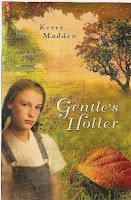 HWM: You’re written four books so far, with a new book to be released in 2008…which book did you have the most fun writing?
HWM: You’re written four books so far, with a new book to be released in 2008…which book did you have the most fun writing?
Kerry: I loved writing OFFSIDES, because it was the first one, and I had no idea what I was doing, so there was a great innocence to the whole process. I feel like the Smoky Mountain trilogy is one big book, and I have loved the research and meeting the people of Maggie Valley. Writing GENTLE'S HOLLER was truly like sticking my face in a field of wild flowers, and I really was excited to discover I could actually write for kids. OFFSIDES was for adults with a lot of YA involved, but with Livy Two, I could tap into being a kid again - a real kid - whose childhood was nothing like mine, but who loved books and music.
HWM: Tell me what inspired your novels.
Kerry: Growing up on the gridiron of college football inspired OFFSIDES. I wasn't a jock or a cheerleader, and I had no place in that world other than a responsible girl babysitter. My husband's family inspired my Smoky Mountain Weems' family novels as I tried to imagine what it was like to grow up with so many siblings. Authors like Betty Smith, Harper Lee, Mark Twain, Catherine Marshall, S.E. Hinton, Carson McCullers, Laura Ingalls Wilder, Lois Lowry, Mary Stolz, Jean Little, Mary Calhoun and others also inspired me as a young girl and teenager. Their stories made my life less lonely, and I read much of them out loud to my little sister. My brothers wouldn't have put up with being read to...
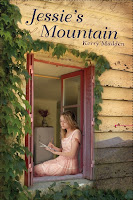 HWM: When did you know you had the right ending for your books?
HWM: When did you know you had the right ending for your books?
Kerry: I knew I wanted to leave GENTLE'S HOLLER and LOUISIANA'S SONG with a question, and I knew I wanted JESSIE'S MOUNTAIN to have a kind of conclusion at this moment in the Weems' family. I hope to write more Weems' family stories but it seemed to right to leave them alone for now where I can imagine them playing or racing around their Smoky Mountain holler.
HWM: Which character is most like you?
Kerry: I suppose Livy Two because she longs for adventures. I love being on the road and meeting new people. We took our kids to Turkey last summer, and that was a wonderful adventure, seeing the kids reinact the battle of Troy at the real Troy, climbing the walls at the Temple of Athena in Assos. I was a bossy kid, though, like Becksie, and shy like Louise. But books and adventure were what I longed for as a child, and I knew the world was a bigger place than college football (my father's profession) and I just had to figure out how to get there.
HWM: Who was the toughest character to write about?
Kerry: Daddy or Tom Weems. Not before the accident - but after the accident. In one pitiful draft, Daddy was "healing in the smokehouse" and my editor, Catherine Frank, said, "Come on! What's happening with him?" My agent, Marianne Merola, who is also a wonderful reader/editor, asked the same thing. I had to deal with it.
I began reading books about traumatic brain injury, and I went to visit a rehabilitation place for brain-jured patients and watched them in their different therapies. It was a huge help and gave me the confidence to write about something I'd never experienced in any degree except for my grandfather's Alzheimer's. I also interviewed a woman whose daughter had suffered a traumatic brain injury, and she was a huge help telling me what to read and so forth.
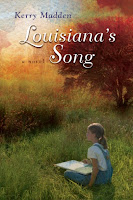 HWM: Which book, if any, would you change if you had the chance, and why?
HWM: Which book, if any, would you change if you had the chance, and why?
Kerry: I don't think I'd change any of them. I'd fix two irritating mistakes in Louisiana's Song. I've learned that cypress trees don't grow in the mountains, and I have Louise peeking out behind one because she loves Vincent Van Gogh, and I was thinking of his cypress trees. There is also a movie reference that I got wrong - "A failure to communicate" is from "Cool Hand Luke" and not "Hud" - and I knew that, but I got it wrong in the thick of revision. Another writer said little gremlins sneak into our stories, which is exactly right...these are not huge gremlins but I am aware of them.
HWM: What do you enjoy about writing historical fiction? Would you like to try another genre and if so, what?
Kerry: To be honest, I didn't even know I was writing "historical fiction by setting the books in 1962, 1963, 1964." Now I do, and I'm so glad I did because I loved doing the research of that time. I also didn't know I was writing "middle-grade" - I thought it was YA...but I was soon set straight by another author who said, "You are writing historical middle grade fiction!"
OFFSIDES, I suppose, was historical fiction, coming-of-age...I am now working on a contemporary novel for kids called "The Fifth Grade Life of Jack Gettlefinger" and I'm enjoying it very much. I also write essays and plays, so I think I will always be exploring other genres.
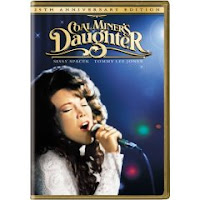 HWM: I would imagine you need to do quite a bit of research to write historical fiction. What secrets can you share on how to get into character, figure out voice, and plot for your novels?
HWM: I would imagine you need to do quite a bit of research to write historical fiction. What secrets can you share on how to get into character, figure out voice, and plot for your novels?
Kerry: I grew up drawing pictures of huge families and pictures of the mountains. I adored the film, COALMINER'S DAUGHTER. I thought it was so beautifully portrayed, and I've watched it every few years since it came out...I was obsessed with Flannery O'Connor and her stories and how she did it with dialogue and setting, and I went to visit her home in Milledgeville. I've done the same with Harper Lee, since I'm now writing her biography for teens.
I think going to the places, returning to the places - even if it's just in your head - helps with voice and story and character. I studied the birds of the Smoky Mountains and flowers, too. I played the music of the region over and over, listening to Raymond Fairchild, the Carter Family, Sheila Kay Adams, Steve Earle, Emmylou Harris, Lucinda Williams, Patsy Cline.
I drown myself in the world of my characters - their music, their food - I've learned to make a mean applesauce cake, but I'm useless at stack cakes. I try to live in their world as much as possible, and when I go back to the South, my eyes perk up, listening.
This will sound like a huge generalization, but in Los Angeles, I'm sometimes around people, myself included, who talk deals and contracts and advances and who got what and who didn't, which is the business here, but in the South, we talk about tomatoes, sourwood honey, and which back roads to take where - in a way I feel more connected to life in the South.
I guess I want my own front porch. When I was stung by yellow jackets last summer in North Carolina, I was in pain but trying to mask it, and the woman at the Stop & Go who sold me Benedryl said, "Bless your heart." I almost burst into tears.
HWM: Do you outline or free form?
Kerry: I write free form until I get into trouble, which I always do, and then I outline. It works.
HWM: Where do you like to write?
Kerry: I love going away to write because the distractions of family life melt away, but I usually write in my office in our house until the kids come home from school.
HWM: What is your writing process or ritual?
Kerry: I just try to get to it. Coffee or tea usually. Sometimes a candle, but that's dangerous with all the paper around my desk, so not often. I play the rain machine if the dogs next door are going insane. Long walks in between with the dogs and a child or two...I love to keep writing at night if the family is away...I can write for longer stretches if I'm alone, but it's much harder if I can hear them stomping around upstairs.
HWM: How long does it take you to write the first draft?
Kerry: At least a year...I rewrite and revise as I go so it takes longer. It also takes me several huge revisions to get to the workable draft. I'm weak on plot, so I have to really insist on getting my characters into trouble.
HWM: What has been the biggest challenge of your writing career and how did you tackle it?
Kerry: I think I am living it right now. I am writing the biography of Harper Lee for teens, and I am terrified I won't be able to pull it off. I'm at the stage right now where I have to stop researching and write her story as best I can for kids. I have been to Monroeville, Alabama twice now...I have hundreds of pages of notes, interviews...and an outline...and forty pages. I just feel a tremendous responsibility to honor her life, her story, and make it accessible to kids. And she's not talking, but she doesn't do interviews...anyway, it looms.
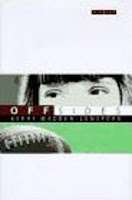 HWM: What has been the biggest surprise of your writing career?
HWM: What has been the biggest surprise of your writing career?
Kerry: The day Diane Keaton said she wanted to option my first novel, OFFSIDES, and make it into a movie. I was beyond excited to meet her. I had to drive to West Los Angeles, and I hoped not to wreck my car before I got there. She was lovely, and she tried for four years to help get OFFSIDES on the screen, but it didn't happen. But it was always kind of stunning to go to meetings with Diane Keaton. OFFSIDES was pitched as a kind of "football coach great Santini from the daughter's point of view."
HWM: If you could share any unique writing tip to aspiring writers, what would it be?
Kerry: Don't quit. I know that's such a cliche, but truly it is everything. Don't take things personally, and it's impossibly hard NOT to take a rejection personally, but just submit your manuscript elsewhere. Or, if it's not good enough, find the courage to make it better.
I also think a strong writing group is a great thing. I've been in one since 1991, and those women are my best friends and strengths. We're all published now in different genres, and when we started nobody was published. And be happy for others who get published...show up, buy their books, be generous.
HWM: What was the best writing advice anyone ever gave you?
Kerry: Laurie Halse Anderson said it best at the same SCBWI Conference where I met Melanie Cecka:
1. Find the stories hiding in your heart and write them down.
2. Polish your stories with the tools of our craft.
3. Submit your work intelligently and professionally.
4. Lather.
5. Rinse.
6. Repeat.
------------------------------------------------
HipWriterMama's Curiosities
HWM: Why do you blog?
Kerry: It started because I didn't know how to update my website. Then I invited kids to be the "Writer of the Day." I think I do it to connect with people. I love putting up pictures now especially of our travels. I encourage kids to have big adventures.
HWM: How much time do you take to write one of your posts?
Kerry: That depends on if pictures are involved, but I usually take an hour...I don't like to slap up something fast. Some of my blogs have become essays published in the LA Times and Washington Post.
HWM: What is your favorite post?
Kerry: All the pictures from Turkey...and my son's love of Halloween.
HWM: If you found a way to go back to your teen years as one of your characters, what would you do differently?
Kerry: I would learn to sing and play the guitar and banjo. I would love to do be able to play either and sing...
HWM: What makes you laugh?
Kerry: Smart people...funny conversations. We had supper in Alabama with a couple who asked me where I met my husband, Kiffen. I replied, "The University of Tennessee where we were students." They looked at each other gravely and then back at me. Finally, the wife shook her head and said, "Well, we play y'all on Saturday." I laughed, but they didn't. I was back in football country where football matters, but it was funny and they laughed too, eventually. Then they explained, "We tailgate." And that me laugh again.
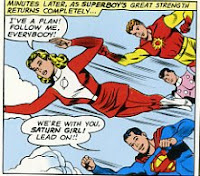 HWM: If you were a superhero, what powers would you want and why?
HWM: If you were a superhero, what powers would you want and why?
Kerry: I'd be Saturn Girl, because she's from the planet, Titan - she's also telepathic, and loves Lightning Lad. And Emmett Weems loves her.
-------------------------------------------
Other Places to find Kerry Madden:
Kerry's website
Kerry's LiveJournal
Kerry's MySpace
Excerpt from Offsides (William Morrow, 1996)
Excerpt from American Girl: Writing Smarts (American Girl, 2002)
Excerpt from Gentle's Holler (Viking, 2005)
Excerpt from Louisana's Song (Viking, 2007)
Excerpt (this may change before publication) from Jessie's Mountain (Viking, to be released in 2008)
Lectitans WBBT interview with Kerry
----------------------------------
Today's WBBT interviews:
David Mack at Chasing Ray
Paul Volponi at The Ya Ya Yas
Elizabeth Knox at Shaken & Stirred
Ellen Emerson White at A Chair, A Fireplace and A Tea Cozy
Jack Gantos at Seven Impossible Things Before Breakfast
David Levithan at Not Your Mother's Book Club
Micol Ostow at Bildungsroman
Laura Amy Schlitz at Miss Erin
Kerry Madden at HipWriterMama
Sherman Alexie at Interactive Reader
Jolene’s been traumatized by wisdom teeth extraction so I’m posting her interview with Julie Halpern. -gayle
First of all I really enjoyed your book. It reminded me of “Girl Interrupted” and “Prozac Nation” except way less depressing (ironic huh?) and much wittier . Was that your intention when writing the novel to show the lighter side of teen depression?
I consider “Prozac Nation” and “Girl Interrupted” to be “pity me” depression books. I’m definitely “pity me” about some things, but depression is not one of them. I always thought my experience at the hospital was so bizarre-how they focused so much on everything that went on in the hospital that we never talked about our lives outside of the hospital; how the kids would do the littlest thing and get in trouble; and how there were so many kids that were dealing with satanic issues. When I looked back it seemed funny. Plus, I like to read books that make me laugh, like the Georgia Nicholsen books. YA books can be very depressing, and I love the ones that can cover serious topics and infuse them with a little humor.
The book is based on your real life experiences. How were you able to overcome depression during your adolescence?
I think it was a combination of antidepressants, therapy, and a change in the way I looked at other people and myself. I started to see that I was capable of really great things, and that everyone is flawed, not just me. College was a wonderful experience for me because I explored a lot of new things- film, feminism, haircuts- and I saw that even when I would go through periods of depression (which I still do), I could come out of them and succeed. It also helped to have great friends and good music to listen to.
In the novel you cite a couple of punk bands like the Ramones, Green Day, and Descendents. What would be the soundtrack for Get Well Soon?
“I Wanna Be Sedated” by The Ramones. “Basketcase” by Green Day. Some James Taylor for the Relaxation scenes. Some hip-hop for Free Time (but old skool, like Slick Rick or something else that tells a good story). And of course The Doors.
By the way I really loved your essay on Degrassi. (I think Kevin Smith secretly wants to be Canadian. Casts Alanis Morissete as God in Dogma then lands a role on Nex-gen Degrassi. That’s like a 1,000 Canadian points.) In any case, if you could write an episode for Degrassi what would be the plotline?
It would involve me as an obnoxious, glamorous American coming onto the scene. I think it would take place back with the original Degrassi cast. It’s so hard for me to talk about Degrassi without feeling a little creepy. I mean, I am in my thirties. I would only guest star as a teenager, not as I am now acting like a teenager. If I were to actually write an episode for Degrassi TNG, it would involve something really deservedly bad happening to Peter. And Jay would be in it because I love Jay. And maybe JT would come back from the dead! And Teri would come back. What ever happened to Teri? People should never ask me Degrassi questions. I could blather on about it for hours.
Your book is based on your personal experiences, what made you decide to write a fictional book for teens rather than an autobiography?
That’s a good question. I think a big part of it is that I didn’t remember every detail enough to write an autobiography. Many of the characters in the book are based on real people, but I had to make up a lot of information about them. I also did not want to write about my family, since I knew it would really upset my mom. I tried to fictionalize the family as much as possible. My real life wasn’t as instantly revelatory as in the book, and there also wasn’t as much romance. But a lot of the really weird stuff, particularly the satanic business, actually did happen. It was a lot of fun to intersperse truth with fiction. But now it’s hard for me to remember which real details I included in the book and which ones I made up!
I really enjoyed the love story between Anna and Justin, are you planning on a sequel for their story?
Since the real life “romance” pretty much ended when I left the hospital, I never thought about a sequel. It would be interesting to explore how relationships like that work outside of the controlled, extremely close quarters of the hospital ward. If there were a large demand from readers, I would definitely think about writing a sequel.
Now that you’ve published a children’s book and YA novel, what other genres would like to try? Graphic novel, tween book, or non-fiction?
I’d like to keep writing for teens for a while because I have quite a few story ideas. Plus, since I work with teens, it’s fun to have their instant feedback on my books. I have kicked around the idea of a graphic novel, since I am a big fan of the genre. My husband is actually working on one right now, and I see how much work it is. I am not an illustrator, though, so that would be a whole giant dimension that I am missing. I’d love for my husband to do it, but he’s got enough of his own stuff to worry about. Maybe someday…
If you weren’t an author/librarian what other profession would you have chosen?
Either a travel agent or a hair stylist.
Your website mentions you were an extra on “High Fidelity.” Is Cusack cute up close?
You know, he was much larger and more manly than I expected. I guess I was still hoping for the gawky Sixteen Candles/Better Off Dead John Cusack. This was a very cigarette-worn John Cusack.
There’s an entire section about zines on your website. How did you get started writing zines? Do you have any tips for creating a successful zine?
I started writing zines after a friend introduced me to The Scaredy Cat Stalker, a hilarious zine that has now turned into a blog. I had done so much writing growing up, but once I was out of college there was no one forcing me to do it. Creating a zine was a great excuse to give myself deadlines and actually publish my writing.
Tips for creating a successful zine:
-Write about what you are interested in.
-Be sincere.
-Care about the way it looks, and people will care to read it.
-Don’t be afraid to express yourself, but do remember that people are out there reading it.
-Don’t use your home address. There are freaks out there. I speak from experience.
-Share your zine with other zinesters. Send it to everyone. Leave it with your tip at funky restaurants. People will spread the word.
What’s it like being on the YALSA Selected Audiobooks committee? And will Get Well Soon be recorded as an audiobook? (Because Trisha thinks it would be a great audiobook.)
I love it. I am the slowest reader with the longest commute, so it’s the perfect committee for me. I love the other librarians on my committee and look forward to seeing them at all of the conferences. I was really worried the first time we met to create our list that it would be scary and shouty, but it was actually filled with great discussions and respect.
I do believe there will be a Get Well Soon Audiobook. I am off the YALSA committee as of January, so nothing can really happen until I finish with that. My dream is to read the audio myself, but it would be neat to hear an expert reader read it, as well. Maybe with an Australian accent! Which would make mo sense, but I lived in Australia for a while and do love the accent. Someday, I’d like to move back there for a while with my family. There and Degrassi Street. My husband and I visited Degrassi Street in Toronto a couple summers ago, and I checked out the cost of homes. I think it’ll happen someday. Um, you were saying something about audiobooks?
Thanks Julie!
Today’s other WBBT interviews:
Lisa Ann Sandell at Interactive Reader
Christopher Barzak at Chasing Ray
Micol Ostow at Shaken & Stirred
Rick Yancey at Hip Writer Mama
Jane Yolen at Fuse Number 8
Shannon Hale at Bookshelves of Doom
Maureen Johnson at Bildungsroman
David Lubar at Writing & Ruminating
Sherman Alexie at Finding Wonderland
Books. Intelligent humor. The Westing Game. The Great Gatsby. Freedom of speech. Cary Grant. Shiny objects. These are a few of Maureen Johnson's favorite things.
I share these interests. I also share Maureen's books with friends and customers on days that end in Y. When I had the opportunity to interview her, I took it. I ran with it. I jumped at the chance.
Then I stopped running and jumping, walked back home, wrapped my questions up into an oddly-shaped package, stuck a bow on top, and presented it to Maureen.
You've known since you were little that you wanted to
be a writer. What was your first completed manuscript/novel as an adult?
Well, I wrote two books for practice. One was for a friend. The other lives in a drawer. They aren't for publication. They really were just exercises for me to try things out. I put myself through a kind of self-imposed writing boot camp when I graduated college, writing four to ten hours a day, usually when I was supposed to be doing something else. Like work.
You studied both theatrical dramaturgy and writing in
college, then worked for a theatre company. Have you
or would you ever appear on stage in a play or
musical?
Can, and have! That's where a lot of my time in college went.
Your first novel, The Key to the Golden Firebird, follows three sisters
as they react to the loss of their father. As an only child, do you find it
easy or difficult to write about families with
multiple children?
I didn't find it all that difficult. I just based it on my relationships with friends and college roommates -- and simple observation. I guess the question really is: did I do it well? Only people with siblings can really answer that.
Your second novel, The Bermudez Triangle, includes my
favorite of your characters, Parker. When populating
your books with witty supporting characters, do you
ever have to struggle with them, begging them not to
overtake the story?
Parker would be hopelessly flattered by that. (Though Keith Dobson from 13 Little Blue Envelopes would take it as a matter of course, except he would clarify that he is a leading man.) I'm not quite sure what the answer to this is, except to say that the chatty ones are coming more and more to the forefront. Jane Jarvis [from Devilish] was my first first-person narrator, and I found it very easy just to let her go on and on and on. In fact, I cut tons from that book where Jane was just going on and on and on to no particular end. Suite Scarlett [to be released 2008] has a slightly more expanded cast, and most of them are talkers. It can be hard to balance the scenes when they just won't shut up, but I try.
You, like Parker, like shiny objects. So do I, and so
did one of my cats, Hollywood.
It's just sensible to like shiny objects. And cats are ALWAYS sensible. This is why I have one as a lawyer. His name is C. Casto Fangola.
Your travels in Scotland led to the story of 13 Little
Blue Envelopes. How did you come up with the idea of a
traveling scavenger hunt perpetuated by letters from a
dead aunt?
When I was growing up, The Westing Game was one of my favorite books. (Still is. See below.) I'd always wanted to do something that involved piecing together a puzzle like that. The first germ of the idea came from an editor. We were talking about what I should do for my next book. There would be 13 letters. But I had no idea what would be in them or how any of this would work. So from there, I spent weeks sitting at home on top of a massive map of Europe -- it's about eight feet wide. I crawled all over that thing, drawing lines, scrawling notes about what could be in each place.
The book changed dramatically as I worked on it. The letters built to a totally different conclusion. I started to feel after a while like I was on the same quest as Ginny -- that I would some day just be told what was in the thirteenth envelope. And one day, somewhere in the middle of what I think was the second draft, it hit me. Looking back at the various drafts, it's astonishing how much that book changed as time went on.
You dipped your toes in the fantasy genre with
Devilish, which also had a basis in reality: your
years at Catholic school. It also had lots of
cupcakes. Would anyone or anything ever tempt you into
making a Faustian deal? (Somehow, I think you'd have
more fun being the tempter than the temptee.)
I think I could be tempted to do something quasi-evil for something quasi-worth it. For example, for permanent upgrades on Virgin Atlantic, I might consider publicly extolling the acting skills of David Hasselhoff. "The Hoff's got it," I would say, sipping a fruity drink while reclining on my flat bed seat. "He's the new Brando. And yes, I will have that manicure."
Girl At Sea is swimming into the hearts
of readers. When did Clio's tale first come to mind?
I had two huge obsessions as a child. (Well, I had more than two, but these were big ones, and they were related.) They were: Pompeii and the Titanic. The Pompeii one came from a set of very old "Book of Knowledge," probably from around 1915 or 1920. It had been at my great-grandparents' house, and a few volumes of it ended up with us. I found an article in it about Pompeii. I read it over and over, committing the pictures to memory. I'm not sure where the Titanic thing really came from (this was long before the movie, or even before the ship was found). I read about it absolutely everywhere I could. Those were kind of the starting points. I starting piecing together a story about a shipwreck that involved finding one specific object, and spent months reading books on scuba diving, ancient Egypt, lost world theory, and maps (making, theft, collection).
While working on the book, I did two things to aid my research. One, I went to Pompeii, which was EXTREMELY exciting for me. (Nerd. I know. But then I came back and went to the Italian beach and had wine, so there you go.) I also took a scuba lesson. This was not something I was very happy about, as I have a very troubled relationship with the water. It is safe to say that I was the worst scuba student they ever had.
Have any pirates or jellyfish weighed in Girl at Sea?
No pirates have. I don't know about the jellyfish, because I am usually too busy running from them. I often joke about my fear of jellyfish, but I should come out and say that it is very, very real and not a joke at all.
Congratulations on your book deal with Scholastic.
What are you working on now?
I'm thrilled about being at Scholastic, and have signed on for several books. Though I have been excited when working on all the books in the past . . . [this book] is really a big deal to me. The book is called Suite Scarlett. It's the story of a family (specifically, a girl named Scarlett who is a part of that family) who run a hotel in New York City. A guest named Mrs. Amberson has just arrived at the hotel. Mrs. Amberson was a Broadway diva in the 70s, and she's returned to New York to write her memoirs. What she does instead is hire (enslave) Scarlett. Soon, she fabulously hijacks everything in Scarlett's life, including her brother Spencer's play and her would-be boyfriend. I can't say much more (though there is a lot more to tell) as I'm rewriting it now, and things are in the process of changing.
What do you think of your shiny book covers? (Yes, we dare to discuss the "headless girl" photo cover trend!
I've gotten a lot of flak about the cover of 13 Little Blue Envelopes. I had nothing to do with it, but I understand the complaints.
The cover is really just the shiny thing that gets the reader's attention in the store. Think about it -- not that many people read as it is. And when you get in the store, you are literally faced with multiple thousands of choices, all of these carefully crafted pieces of art that are designed to entice you. They may have no relation to what's between the covers. They exist as a kind of "pick me! pick me!" device. None of it is arbitrary. Artists, marketing people, sales people . . . they all sit around for hours debating, designing, re-designing. The headless girl (or really, eyeless girl), I am told, is to give you the chance to use your imagination for the rest of the face.
That being said, I don't like the eyeless girl very much, and I never really felt like the picture was a good representation of Ginny. I appreciate the effort that went into making it, but the super-thin midriff shot wasn't really in keeping with the book's themes. I try to write about strong women, and that picture always just said to me, "I am thin, and I wear jeans. Behold, my abs." I would have preferred a different photo.
I'm glad to report that Scholastic has gotten me involved from the get-go with the cover of the new book. They agreed right away to no more eyeless photos. I've been looking at sketches for the cover, and they look fantastic. I've also had a hand in choosing models and talking about the pose, the outfit and the setting of the shoot, so that it reflects the description given in the book.
You are also a fan of classic film stars, such as Cary
Grant and Jimmy Stewart. Would you ever write a story
set in the movie industry?
It's possible. There is a strong nod to that era in Suite Scarlett (though it takes place in the present). Also, I watched It Happened One Night when I started Girl At Sea, and I really took a page from that film -- the tone, the relationship. I like to think of it as the first YA archeological mystery-screwball comedy. I think this genre is going to go HUGE!
What are your ten favorite books of all time?
I have no idea, which is why I always avoid this question. There's no way to decide. How about I tell you the ten favorite books I can see here from my desk, right now? Because I keep some of the really good ones close by.
1. The Great Gatsby (possibly my favorite since the age of 15)
2. The Hound of the Baskervilles by Arthur Conan Doyle (The first "real" book I remember reading, in a shortened edition for children--notable for its spectacular use of shiny things, including the shiny silver teapot in which Holmes sees Watson's reflection. I can still see where I was sitting when I read that and remember thinking that this Holmes guy was someone I was going to like.)
3. The Code of the Woosters by P.G. Wodehouse (Plus any and all Jeeves stories. This is just a very good one.)
4. Auntie Mame by Patrick Dennis (and the follow-up, Around the World with Auntie Mame)
5. The Westing Game by Ellen Raskin
6. Persuasion by Jane Austen
7. Yes . . . Harry Potter (By that I mean all the Harry Potter books. There is no book called Yes, Harry Potter! That sounds like a musical.)
8. Benchley at the Theater, a collection of Robert Benchley's theater criticism
9. Fear and Loathing on the Campaign Trail '72 by Hunter S. Thompson
10. The Innocents Abroad by Mark Twain (This is the book I remember laughing the hardest at -- possibly of anything in my entire life. I literally fell out of my chair.)
Many thanks to Maureen Johnson for talking with me.
This interview has been approved by Free Monkey.
Related Posts:
The Bermudez Triangle: Too Cool for School?
Free Monkey World Tour: Girl Meets Monkey
Free Monkey World Tour: Take Your Monkey to Work Day
Girl at Sea book review
Meet Maureen
Saturday, November 17th
National Council of Teachers of English annual convention
Jacob Javits Center
New York, NY
Visit the HarperCollins booth #571 between 12 and 1 PM.

Today's WBBT Schedule:
Lisa Ann Sandell at Interactive Reader
Christopher Barzak at Chasing Ray
Julie Halpern at The Ya Ya Yas
Micol Ostow at Shaken & Stirred
Rick Yancey at Hip Writer Mama
Jane Yolen at Fuse Number 8
Shannon Hale at Bookshelves of Doom
Maureen Johnson at Bildungsroman
David Lubar at Writing & Ruminating
Sherman Alexie at Finding Wonderland
 There she weaves by night and day
There she weaves by night and day
A magic web with colours gay.
She has heard a whisper say,
A curse is on her if she stay
To look down to Camelot.
She knows not what the curse may be,
And so she weaveth steadily,
And little other care hath she,
The Lady of Shalott.
- The Lady of Shalott by Alfred, Lord Tennyson, lines 37-45
Sound familiar? Do you remember when you first heard those evocative lines? I do. I bet I'm not the only one with this memory, either. As indicated by the picture of Megan Follows, I was introduced to Tennyson through the television when watching Anne of Green Gables over, and over, and over again. The movie opens with the lines, and I've never forgotten them. It symbolizes how trapped Anne Shirley feels in her life before Green Gables, and Elaine of Ascolat reappears when the ice is finally, finally broken between Anne and the love of her life. While this was my first introduction to Tennyson, I found myself returning to him over and over again as I grew up. I recited, for extra credit, The Charge of the Light Brigade in high school. I talked my way out of Jane Austen in favor of a Tennyson paper in Brit Lit in college. I foisted him off on some poor HS student looking for a descriptive poet last week at the library. So, yeah. I've been enamored for a long time, but not so much as today's author, Lisa Ann (no 'e') Sandell.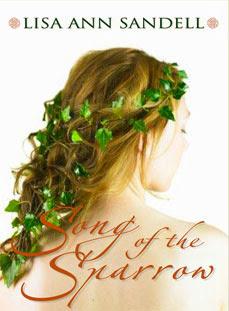
In Song of the Sparrow, Sandell has taken cursed, maligned Elaine and re-imagined her in a world without curses; without even magic. She's kept the contact with Camelot, but we now find our heroine with spirit and spunk and hope for future. She isn't a doomed waif. She matters to us, and to the dynamic men of myth who surround her. She is as powerful and inspiring as the language Sandell uses for her tale.
You can find more Lisa in Colleen's fantastic interview from yesterday. I especially love where they talked about merging another cursed character from lore, Tristan, into Elaine's story.
But on to our interview!
1. Do you remember when you first encountered Tennyson's poem The Lady of Shalott? Or his Idylls of the King? Both clearly had great influence over Song of the Sparrow. If you remember, what was your first introduction to Arthur & Elaine?
I first read Tennyson's Arthurian poems in high school, but became truly enamored with them as an English major in college. Of the two works, I have always been more drawn to "The Lady of Shalott," with its haunting depiction of the young woman weaving alone in her tower, rather than the more eventful — and tragic — events of "Idylls of the King." Reading "The Lady of Shalott," I was struck not only by the elegance of the language and the exquisite story, but also by the inescapable subtext of the poem, that which presents Elaine as a sort of patron saint of artistic creation: Alone in her tower, she weaves, isolated from the world, doomed to see only reflections. As a —let’s be very honest here — dorky and unpopular teenager who often found comfort in writing, I identified with Elaine instinctively, even though it took me many readings and college classes to fully realize why.
2. The Tennyson poems are quite famous, and (among other things) inspired Waterhouse's haunting painting. However, the Lady of Shalott, Elaine, is largely unknown by the large players of Arthurian myth in both poems. She's referred to as "the fairy" in one, and is merely a pawn for Lancelot in the other. How did you get her from a footnote of legend to a pivotal role?
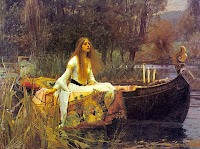 My own infatuation with the Lady of Shalott began after I saw the 1888 Waterhouse painting. I was spending a semester in London, and snuck into the Tate one afternoon to find shelter from the freezing rain. I was walking aimlessly through the galleries, and there, suddenly, she was: her ghostly white gown, her golden-red hair, and her expression, tortured and yet calm, the face of someone who had come to terms with a terrible fate. Being somewhat of an Arthurian buff, I had no difficulty recognizing who she was, but as I walked home that evening questions began to swirl around in my mind: Why a curse? Why death? Elaine, I couldn't help but thinking, was first and foremost a young woman, close to my own age at the time, and the more I thought about her the more fascinated I became with what this person’s life meant, what the sum of all its parts and versions and stories were. And, if she were a real girl, what would her life have been like? That was the origin of Song of the Sparrow, an attempt to imagine a normal life for Elaine, a life filled, like any other, with hardships and triumphs, challenges and joys, heartbreaks and romance. It was partly an act of proud feminism, and partly one of historic and artistic curiosity.
My own infatuation with the Lady of Shalott began after I saw the 1888 Waterhouse painting. I was spending a semester in London, and snuck into the Tate one afternoon to find shelter from the freezing rain. I was walking aimlessly through the galleries, and there, suddenly, she was: her ghostly white gown, her golden-red hair, and her expression, tortured and yet calm, the face of someone who had come to terms with a terrible fate. Being somewhat of an Arthurian buff, I had no difficulty recognizing who she was, but as I walked home that evening questions began to swirl around in my mind: Why a curse? Why death? Elaine, I couldn't help but thinking, was first and foremost a young woman, close to my own age at the time, and the more I thought about her the more fascinated I became with what this person’s life meant, what the sum of all its parts and versions and stories were. And, if she were a real girl, what would her life have been like? That was the origin of Song of the Sparrow, an attempt to imagine a normal life for Elaine, a life filled, like any other, with hardships and triumphs, challenges and joys, heartbreaks and romance. It was partly an act of proud feminism, and partly one of historic and artistic curiosity.
3. In Tennyson's Idylls of the King, Guinevere says, "'Arthur, my lord, Arthur, the faultless King,/ That passionate perfection, my good lord--/ But who can gaze upon the Sun in heaven?... / He is all fault who hath no fault at all: / For who loves me must have a touch of earth..." This statement humanizes a character that is often villainized in adaptations. Your Gwynivere expresses a similar statement - that Arthur is too perfect to truly love. You have, in fact, portrayed all three of the females (Gwynivere, Elaine, Morgan) connected to the tale in a far more favorable light than they are traditionally depicted. Why? Why all three?
It is this aspect of Arthur, his perfection, that makes him such an indelible symbol of hope. So, in writing this book, I wanted to explore that piece of his character and how other people would have reacted to and interacted with him and also try to find the humanity in his perfection.
And, again, I wanted Song of the Sparrow to portray the women surrounding Arthur as they've seldom been portrayed, namely, neither as damsels in distress nor as villains and connivers, but rather as well-rounded human beings thrust into a complicated scene and forced to make their way in a traditional and patriarchal society.
In this sense, all three women in my book represent, perhaps, a different and maybe more realistic strategy for coping as a young woman in a world dominated by men. And so, even when my Gwynivere is being nasty and condescending to Elaine, and when Elaine, in turn, plays a cruel joke on Gwynivere, I still bear in mind that rather than their being mythical figures, they are two adolescent girls, alone in a camp full of warriors, living in a time of great uncertainty and fear, and struggling to make sense of their world. Whatever their tactic — whether they choose to be haughty and prim or tomboyish and straightforward — they end up developing empathy for one another and working together for the greater good, which, I think, is an issue many young women at that age struggle with, even today.
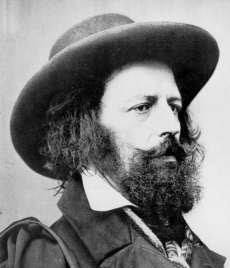 4. What do you think Tennyson's curse was, and were you at all tempted to include some sort of curse on your Elaine? Even a non-magical one?
4. What do you think Tennyson's curse was, and were you at all tempted to include some sort of curse on your Elaine? Even a non-magical one?
As Tennyson's curse was the incentive for me to go out there and imagine a better, more plausible, and fuller life for Elaine, I had no wish to curse her myself. And, as for the nature of the curse, I really don't know — it's a great question. I can guess that the weaving Elaine is the embodiment of artists everywhere, practicing her craft in loneliness, doomed always to observe the world but never to be in or of it. That makes a lot of sense to me…especially as a writer who practices her craft in solitude.
5. Have you any thought to continuing with further stories in the world you adapted for Song of the Sparrow? Perhaps picking up with a different character's point of view? 'Cause I'd TOTALLY read it, and I know several others who would too...
That’s really nice. Thanks. J I’d love to keep going with this. I have a huge crush on Arthur and am wholly fascinated by the mythology, by the process of re-imagining the setting and the situations and trying to fill in the blanks myself, by the research, by all of it. I don’t have any definitive plans at the moment, but that is certainly not to say that I wouldn’t pick up with it someday. Because, I’m talking borderline obsession.
6. In your author's note at the end you talk about doing extensive research. How did you go about that?
I began with a short reading list: Thomas Malory’s Le Morte D’Arthur and Winston Churchill’s A History of the English-Speaking Peoples. Then I happened upon a BBC radio piece about the Merlin’s presence in ancient Welsh poetry and decided to try to get my hands on translations of some of the ancient texts. And then when my husband saw my pile of books start to grow and overtake our tiny living room, he bought me Geoffrey of Monmouth’s The History of the Kings of Britain. Very romantic, yes? It was about five months of solid reading and note-taking, during which I also listened to recordings of birdsong, read up on what species of plants and trees and animals are native to the United Kingdom, and learned about healing plants and their uses.
7. Camelot is our ideal. It was a place where honor and justice was paramount. Your Elaine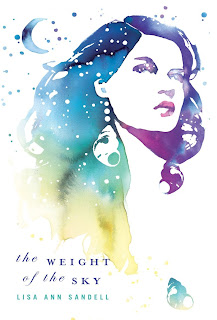 won a war without lifting a weapon beyond her own wits and helped secure the possibility of Camelot. Is the idea of non-violent solutions to conflict at all connected to your experiences in Israel and some of the thoughts expressed in your first novel, The Weight of the Sky?
won a war without lifting a weapon beyond her own wits and helped secure the possibility of Camelot. Is the idea of non-violent solutions to conflict at all connected to your experiences in Israel and some of the thoughts expressed in your first novel, The Weight of the Sky?
I don’t believe I drew this connection consciously, but we’re living in a world that is rife with war and it is possible — probably normal — to feel overwhelmed and engulfed by rage, helplessness, and hopelessness because of it. Over the years I have spent a lot of time in the Middle East, mostly in Israel. And like so many people, I am deeply troubled by the conflict there; it makes no sense to me. I simply cannot understand why the leaders can’t figure out a way to make peace. In The Weight of the Sky, Sarah only begins to grapple with these questions, but I feel like my consciousness is, in a way, saturated with this sense of powerlessness and frustration as I watch the violence continue to play out in that particular corner of the world, and also on the larger global stage. Now that you’ve posed the question, yes, I believe Song of the Sparrow reflects the maturation and growth of my own thoughts on questions of war and conflict and injustice.
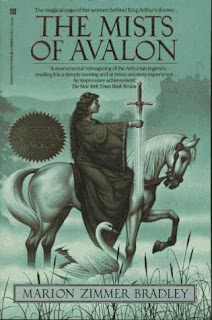 8. Do you have a favorite Arthurian adaptation?
8. Do you have a favorite Arthurian adaptation?
My favorite will always be Le Morte D’Arthur, for its comprehensiveness and romance, and because it is so much a cornerstone of the mythology. However, Marion Zimmer Bradley’s The Mists of Avalon is a very close second. She was truly a pioneer and a genius. She re-imagined the legend in such a far-reaching and brilliant and unpredictable way, so rich, so full of depth and music. Her Morgaine is a heroine for the ages — strong and intelligent and brave and human.
9. Since your first two novels have been so vastly different, can you tell us a little about what we'll see from you next?
The book I’m currently working on is also a YA novel. It’s contemporary and…not in free verse! The title is A Map of the Known World, and I think it’s going to be very different, again, from the first two — at least in terms of the setting — as this one is set in a high school in the Midwest in the United States. I’m really excited and intimidated to be working on a contemporary piece.
10. You've said that you've always been a voracious reader. Who/what are some of your current YA favorites?
My list of favorites is very, very long, but a shortlist would include: Kevin Brooks, Cecil Castelucci, Chris Crutcher, Sarah Dessen, Aimee Friedman, Adele Griffin, Alice Hoffman, M. E. Kerr, Madeleine L’Engle, David Levithan, Patricia McCormick, Walter Dean Myers, Gary Paulsen, Alison Pollet…I could keep going, but I’ll stop here.
Lisa, you are awesome! Thank you SO MUCH for subjecting yourself to my questions! I am excited to read A Map of the Known World!
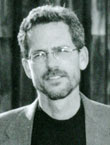 "If you're looking for a good action-packed adventure book with sword wielding monks, high speed car chases, lots of blood and gore, sweeping helicopter rides, and an unexpected hero who gives you a few laughs and manages to save the world from destruction, look no further. Alfred Kropp is here. Oh, yeah. " This is what I wrote in a recent post , Great Books for Boys: Meet Alfred Kropp.
"If you're looking for a good action-packed adventure book with sword wielding monks, high speed car chases, lots of blood and gore, sweeping helicopter rides, and an unexpected hero who gives you a few laughs and manages to save the world from destruction, look no further. Alfred Kropp is here. Oh, yeah. " This is what I wrote in a recent post , Great Books for Boys: Meet Alfred Kropp.
The Extraordinary Adventures of Alfred Kropp (hardcover October 2005, paperback Jan 2007) is Rick's first children's (YA)book. Book Two, Alfred Kropp: The Seal of Solomon was released in May 2007. The third book is due to be released in May 2008. Rick has also written three adult titles: A Burning in Homeland, Confessions of a Tax Collector, and The Highly Effective Detective.
Check out the awards for The Extraordinary Adventures of Alfred Kropp: Publisher's Weekly - Best Books for Children - 2005; Booksense Best Books - Winter 2006; Texas LoneStar Reading List - 2006; Carnegie Medal Nominee - 2006; Featured Author/Book - Scholastic Book Fairs - Fall 2006.
I really enjoyed the Alfred Kropp books. They are perfect for reluctant readers, awkward teens and dreamers. Rick Yancey draws the reader into the total reading experience, so the action unfolds right before your very eyes. Teens will be thrilled by the "cinematic" view of Alfred's adventures and heroics. This is probably one of the reasons why Warner Brothers Pictures and Akiva Goldsman recently purchased the movie rights to The Extraordinary Adventures of Alfred Kropp. If the book is this action packed, can you even imagine what the movie will be like? Teen boys will drool.
Without further ado, please welcome Rick Yancey.
-----------------------------------------------
HWM: I find your bio so interesting. You worked for the IRS, wrote screenplays, and have been a film critic. What made you realize you wanted to write books?
Rick: I realized I wanted to be writer in middle-school, when a teacher assigned a five-page narrative paper and I turned in 25 pages! I wrote a note to him, apologizing for the length, and he wrote back, “Never apologize for something you should be proud of.”
That note always stuck with me. Of course, I was also deeply affected by reading itself, and from an early age wanted to create the thrills I experienced while reading.
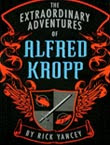 HWM: What inspired you to write The Extraordinary Adventures of Alfred Kropp and how did it evolve from a book for adults to a book for teens?
HWM: What inspired you to write The Extraordinary Adventures of Alfred Kropp and how did it evolve from a book for adults to a book for teens?
Rick: KROPP began as a detective story, of all things. I wanted to write a first novel in a detective series and my hero was 33 at the beginning of the book, with basically the same plot line: Excalibur, the magical sword of King Arthur, has survived to the present day and is lost into the hands of evil.
Publishers loved the idea, but their marketing departments did not. Too many genres. So, at the suggestion of my agent, I changed the protagonist from a 33 year old detective to a 15 year old orphan. Thus the entire Kropp series could be called a happy accident!
HWM: What do you find more rewarding: writing books for teens or adults?
Rick: I laugh more with teen books; cry more with adult ones.
HWM: How long did it take for you to write The Extraordinary Adventures of Alfred Kropp and Alfred Kropp: The Seal of Solomon?
Rick: A little over a year on the first one, if you add in the time it took to write it first as a detective story. SOLOMON about ten months.
HWM: How much research did you have to do about Arthurian legend and the Seal of Solomon?
Rick: Much more research went into SOLOMON, since I was not familiar with the legends surrounding the Great Seal. Excalibur took only a few days, since I was quite familiar with the stories.
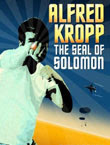 HWM: When did you know you had the right ending for each of the Alfred Kropp books?
HWM: When did you know you had the right ending for each of the Alfred Kropp books?
Rick: My breath grows short and I feel this tightening in my chest. An “oh yeah!” feeling. For example, when I realized Alfred was going to fall from 28,000 feet in the second book, without a parachute, it was like, “Oh, yeah!”
HWM: How did you work out the action scenes for the Alfred Kropp books? I could visualize these scenes and enjoyed the movie-like quality.
Rick: I act out all the action scenes (within reason). Much more fun that way.
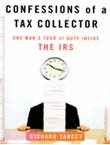 HWM: Which character, if any, is most like you?
HWM: Which character, if any, is most like you?
Rick: Nobody, hopefully. I’m not that interesting, although I did write a memoir (CONFESSIONS OF A TAX COLLECTOR) to prove it.
HWM: Who was the toughest character to write about?
Rick: Bennacio, the Last Knight in the first book. He’s such an anachronism, so closed off and a keeper of his own counsel, I had difficulty getting him to open up, even to me!
HWM: I understand you’re working on the third Alfred Kropp book. What can you tell me about this one? When is it due to be published?
Rick: It is due in stores May 2008. It picks up at the exact moment that Book Two leaves off. The “sacred object” in this one is the owner of the 13th Skull. I won’t reveal anything more than that.
 HWM: Congratulations. I understand the film rights to The Extraordinary Adventures of Alfred Kropp have been sold to Warner Brothers. Will you be involved in writing the screenplay? What can you tell me about this project?
HWM: Congratulations. I understand the film rights to The Extraordinary Adventures of Alfred Kropp have been sold to Warner Brothers. Will you be involved in writing the screenplay? What can you tell me about this project?
Rick: The screen play was written by David Iserson, a former SNL writer. Producer is Weed Road, owned by Akiva Goldman, who did MR. & MRS. SMITH and The Da Vinci Code, among others.
(Note: I just found out Akiva Goldman won an Oscar for Best Writing, Screenplay Based on Material Previously Produced or Published in 2002 for A Beautiful Mind. This book is in good hands.)
HWM: People get nervous about movies that are adapted from children's books. What can you tell your fans to reassure them?
Rick: It’s just a movie.
HWM: Any words of advice for those authors who would like to get their books made into movies?
Rick: Like I told my son recently while hunting for shark’s teeth: The secret is not to find the tooth, but allow the tooth to find you.
HWM: What have you learned about your experiences surrounding Alfred Kropp?
Rick: Kids take characters very seriously, as if they are real people. I do, too, so we have that in common.
HWM: Do you outline or free form?
Rick: I never outline. It leads to a lot of discarded pages and wasted time, but I can’t seem to work any other way. If I try to outline, I get bored. I’d rather be almost anything than bored.
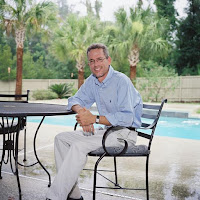 HWM: Where do you like to write?
HWM: Where do you like to write?
Rick: On my lanai by the pool.
HWM: What is your writing process or ritual?
Rick: I begin my typing, “Chapter One,” and I end by typing, “The End.”
HWM: What has been the biggest surprise of your writing career?
Rick: How publishing really works. Or doesn’t, as the case may be.
HWM: If you could share any unique writing tip to aspiring writers, what would it be?
Rick: Never let rejection stop you. If writers did, we wouldn’t have any books to read. Every writer gets rejected; it’s part of the game.
HWM: What was the best writing advice someone ever gave you?
Rick: Sit down, write something, and stop complaining.
---------------------------------------
HipWriterMama's Curiosities
HWM: Tell me about the most interesting comment from a fan.
Rick: “I bought your book from a book fair for $5. Thank you for writing such a cheap book.”
HWM: If you could choose, which actors and actresses would play your characters?
Rick: Nobody is up to the task.
 HWM: Did you test drive cars in the name of research for your books?
HWM: Did you test drive cars in the name of research for your books?
Rick: Don’t I wish!
HWM: If you found a way to go back to your teen years, what would you do differently?
Rick: I would run away and live in a monastery until I was twenty.
HWM: What makes you laugh?
Rick: When somebody cuts anybody down to size, including when it happens to me.
HWM: If you were a superhero, what powers would you want and why?
Rick: I always wanted to fly.
Thank you, Rick!
---------------------------------------
Other places to find Rick Yancey:
Rick's website
Alfred Kropp's MySpace
Excerpt from The Extraordinary Adventures of Alfred Kropp
An excerpt from Alfred Kropp: The Seal of Solomon can be found here: click the link for Preview the Book.
----------------------------------------
Today's WBBT interview schedule:
Lisa Ann Sandell at Interactive Reader
Christopher Barzak at Chasing Ray
Julie Halpern at The Ya Ya Yas
Micol Ostow at Shaken & Stirred
Rick Yancey at HipWriterMama
Jane Yolen at Fuse Number 8 (Part One & Part Two)
Shannon Hale at Bookshelves of Doom
Maureen Johnson at Bildungsroman
David Lubar at Writing & Ruminating
Sherman Alexie at Finding Wonderland
Since the inception of Not Your Mother's Book Club, every time I've asked members who they'd like me to interview, the most overwhelming requests have always been for Judy Blume. We all grew up with her books, from Freckle Juice to Fudge... to Margaret, and then of course, Forever.
I know that Judy Blume made me love reading, and reading YA in particular. I think it is safe to say that without her books, there would be no NYMBC. So please welcome, the legendary La Blume!
 Hi, Judy - thanks so much for joining us. Your new book, SOUPY SATURDAYS WITH THE PAIN AND THE GREAT ONE, is for the younger set. Will you tell us a bit about it?
Hi, Judy - thanks so much for joining us. Your new book, SOUPY SATURDAYS WITH THE PAIN AND THE GREAT ONE, is for the younger set. Will you tell us a bit about it?JB: Jennifer -- I'm cheating here -- but everything I can tell you about the book is already on my website -- so to save time I've pulled up that page. Thanks for understanding!
Seven energetic and comical new stories about the spunky siblings first seen in The Pain and the Great One. In equally sassy voices Abigail, 8, and Jake, 6, capture slices of Saturday life, from getting haircuts to dog-sitting. With sly illustrations by James Stevenson. The first in a series of four chapter books.
I first wrote about the Pain and the Great One when my kids were six and eight years old. I’ve always wanted to write about these characters again, but this time in a longer book where I could get to know their family and their friends. I wrote one story a couple of years ago just to see if I could do it. I liked it and thought, “This is going to be fun!” But then other projects got in the way so I had to put the Pain and the Great One away. Finally, I said, “It’s now or never!
Last summer I sat around with my grown daughter and son (who inspired the original picture book) and shared some of the stories I’d written. They started to reminisce --
“Remember the magnifying glass?”
“Remember the bully on the bus?”
Soon, my daughter was reminding my son that she was the Great One, and he was the Pain. My grandson found it wildly funny to see his Mom and his favorite uncle acting like six and eight year old siblings.
When I thought I had finished the book I realized that Fluzzy, the cat, needed to have his say, too. I liked writing from Fluzzy’s point of view. So now all four chapter books in this mini series will end with Fluzzy.
The Title: All the stories in this book take place on Saturdays. And the haircutter’s name is Mr. Soupy. Put that together and you get Soupy Saturdays. (Plus there’s more about soup but I don’t want to give that away here.)
How is it different to write an early chapter book than to write a YA book or an adult book? Do you approach the writing differently?JB: The writing process is exactly the same for me. And it's always hard, especially the first draft. The one difference is, I've never written short stories. Even though the main characters are the same in each story (the Pain and the Great One) it means coming up with more ideas -- (specifically seven ideas for each of the four books). You know that question - where do you get your ideas? That's my least fav question. It's a question that scares me because I'm never really sure. With novels, things evolve. I feel exactly the same as Jerry Spinelli when he says, it's the middle of a novel that's the hardest part. With a book of short stories for young kids there's not much room for a middle. You have to keep the energy level up the whole time.
What is your writing routine? Do you have any weird writing habits?JB: If I don't write in the morning, I won't write all day. So it's really important, when I'm writing a book, not to get sidetracked by e-mail or my blog (or other blogs) before I start my real work for the day. That's what I tell myself, anyway. I need three hours of quiet time -- from 9-12, let's say - to get a book going. After lunch I'll read over what I wrote earlier and make notes -- lots of notes on the printout -- you wouldn't believe what my early drafts look like! You wouldn't believe how many drafts I go through with each book, either. But I probably won't do any new writing in the afternoon. That's when I should do my e-mail, go to the gym, and catch up with everything else.
As for weird writing habits -- I wish I could tell you I can't write without twirling around the room three times, or sharpening 20 pencils, or dressing like my main character -- or something even weirder -- but that wouldn't be true. I have enough distractions in my life. Maybe that's why I don't have any weird writing habits. Now, if you ask my grown kids -- I know they think I have lots of weird habits! (They're just not weird writing habits!)
I know it is probably a bit like picking favorite children, but -- what have been a few of the favorite characters that you've created, and why?JB: It is like asking a mother which is your favorite child? It's not a question I can answer easily or happily. Once I get started I can't stop. But okay -- Margaret is one of my favorites because she brought me my first readers. And Fudge is everyone's favorite and was based on my son Larry when he was a toddler. Then there's Sally J. the character who's most like the kid I was. See, I told you once you get me started....
What books did you love when you were a kid / teenager?JB: When I was about 9 or 10 I started reading the Betsy/Tacy series by Maud Hart Lovelace. I loved those books. The series begins when the girls are very young and it goes all the way to Betsy's wedding.
When I was a teenager (actually, by the time I was 12) I was browsing in the bookshelves at our house. My parents were both readers and I found some fantastic books on my own. Lucky for me, nobody ever told me what books I
could read and what books I
couldn't. There were no YA books then. I remember my mother handing me Ann Frank's
Diary of a Young Girl and
To Kill a Mockingbird years before those books were ever assigned reading at school. I loved them. I found
Catcher in the Rye on my own. I remember sitting on the floor reading it. That got me interested in everything else Salinger wrote. But Catcher was recently assigned reading in my grandson's class and he couldn't stand it. He didn't identify at all. He liked Frank Portman's novel about the boy who didn't like Catcher. I read a lot of books before I had any idea what they were about, like Ayn Rand's
Fountainhead, and
The Adventures of Augie March by Saul Bellow. I liked reading about the things adults kept from children. I hated secrets. I still do.
If you could give a teenage aspiring writer any advice, what would it be?JB: Never give up. Don't let anyone discourage you. You write because you have to, because of some burning inside you. Nobody writes because it's a cool thing to do. It's too hard. And it never gets any easier. But you'll get better and better at the craft of writing. I don't think I could have survived without writing, or maybe it was the creative work I needed so badly, maybe it could have been any creative outlet. I don't know. What I do know is how glad I am to have found my way.
Is there any question you WISH I had asked that I didn't?JB: check out my website
judyblume.com and you'll find everything you ever thought about asking. My new website (same name, same info, cool graphics, and better organized) should be launched very soon. And I'm trying to Blog -- which reminds me, it's been a couple of weeks since my last entry! Better get to that right now.
Thanks so much!Thank you!
--
There are about a million questions I wanted to ask and didn't have the time or presence of mind to get to. Visit Judy online for tons more,
HERE.
Read Judy's blog
HERE.
Buy
Soupy Saturdays, or any of Judy Blume's books, from a very sweet independent bookseller
HERE.
Visit today's other WBBT sites:Lisa Ann Sandell at
Chasing RayPerry Moore at
Interactive ReaderAutumn Cornwell at
The Ya Ya YasJon Scieszka at
Seven Impossible Things Before BreakfastGabrielle Zevin at
Jen Robinson's Book PageErik P. Kraft at
Bookshelves of DoomClare Dunkle at
Miss ErinChristopher Barzak at
Shaken & Stirred
Here's the schedule for today's WBBT interviews:
Lisa Ann Sandell at Chasing Ray
Perry Moore at Interactive Reader
Christopher Barzak at Shaken & Stirred
Autumn Cornwell at The Ya Ya Yas
Jon Scieszka at Seven Impossible Things Before Breakfast
Gabrielle Zevin at Jen Robinson's Book Page
Judy Blume at Not Your Mother's Book Club
Erik P. Kraft at Bookshelves of Doom
Clare Dunkle at Miss Erin
-------------------------------------------------------------
I'll have an interview with Rick Yancey here tomorrow!
View Next 10 Posts














































A delightful St. Patrick's Day book I've recently discovered--which I noticed was not on your list--is Tomie dePaola's Patrick: Patron Saint of Ireland. This is a charming biography of St. Patrick for kids in the 6-to-8-years category. The book has some interesting information on legends about St. Patrick in addition to the more strictly biographical materials. Ever wonder why the shamrock is significant? Get an explanation in this book! It's a really fun, interesting book, and dePaola's artwork is fantastic as always. He has a real knack for books that retell traditional or historical stories.
Thanks for sharing Aaron. I am very fond of Tomie dePaola's work. Have you reviewed the book? If you have, do send us a link to the review.
You're quite welcome. I just finished a review of the book. The link is here: http://www.childrensbooksandreviews.com/charming-biography-courageous-exemplar-review-of-patrick-patron-saint-of-ireland/
You can also just click my name and that should take you to the review.